Pamela Clare's Blog, page 23
October 30, 2011
Marie Force talks about the book of her heart
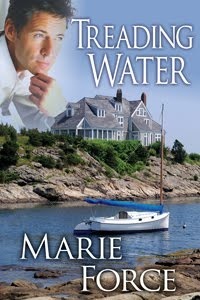
Happy Monday, everyone! I've asked Marie Force to join us today to talk about her new release TREADING WATER. During the months that I've known Marie, she's talked repeatedly about this book and how it is the book of her life. I found her journey from writing the first page to the books release to be very moving. I thought you'd find it moving as well.
So please welcome Marie Force.
Marie Force: Thanks so much for having me, Pamela! I always love visiting with you and your readers.
Pamela Clare: I'm so glad you could make time to stop by and answer some questions. Tell us about the plot of your latest book.
MF: Sure, here is the brief synopsis for Treading Water:
Love is the last thing on Jack Harrington's mind when he sets out to meet Andi Walsh's flight. Recently back to work after spending more than a year tending to his comatose wife, Jack is focused on getting through each day and caring for his three daughters. However, the moment he sets eyes on Andrea Walsh, the interior designer who has come to decorate the hotel his company is building in Newport, Rhode Island, Jack begins to wonder if Andi might be his second chance.
After a disastrous marriage, Andi, single mom to a hearing-impaired son, isn't exactly looking for love, either, but that's what she finds with Jack. The two embark on a long-distance relationship fraught with challenges as they balance the needs of their children and dueling careers while Jack continues to care for his wife, Clare. Just when Jack thinks his life is once again settled, he is confronted with a new challenge that tests him in ways he never could've imagined, leaving him to wonder if "happily ever after" is in the cards for him.
PC: You've told me this is the book of your heart and shared journey behind this book with me. Can you share it with my readers?
MF: It is most definitely the book of my heart, Pamela! Treading Water was the first book I wrote, way back in 2005. Jack Harrington was the first character to show up fully formed in my imagination around 2002. We had a long flirtation until I finally put fingers to keys to write his story. It's been a long journey since the day I wrote "the end" in May 2005 to last week when Treading Water was finally available for sale. I laugh all the time at how I totally overwrote the first draft of TW. It's now 60,000 words "slimmer" than that initial version. However, I learned from that experience and it hasn't happened again. Two sequels to TW are coming soon, Marking Time (Nov. 29) and Starting Over (Dec. 27). These three books are my favorites of all my books, so this is a very exciting time for me!
PC: I think your books are a clear example of outstanding writing and storytelling that just doesn't fit in the NY box, for example, the hero and heroine being relationships with other people at the beginning of Love at First Flight. What advice do you have for other writers whose work likewise challenges some of those rigid rules of romance?
MF: I definitely don't fit in the NY box. That used to bother me, but it doesn't anymore. Now that I've had a taste of indie publishing and enjoyed full control over every aspect of the process and made a lot of money doing it, I'm grateful for all the rejections I received over the years. Every one of them led me to the place where I am now, and I'm in a very happy, indeed. As for those rigid rules you mentioned, I refer to Treading Water, Marking Time and Starting Over as the books I wrote before I "knew better." I believe my ignorance made them better books than they would've been if I wrote them today with all my knowledge of "the rules." I strongly advocate that authors write books they are passionate about. If we don't love our own books how can we expect that anyone else will? The good news is that if your square-peg book doesn't fit into traditional publishing's round hole, you have many options you wouldn't have had even a couple of years ago. (I didn't intend for that metaphor to get dirty, but hey, I'm a romance writer!)
PC: Much has been made (and justifiably so) of your success as a self-published author. Certainly, you've been a huge help and inspiration for me and others. Where do you see publishing a year or two down the road?
MF: Oh boy, that's a loaded question! In light of economic realities, I think traditional publishing will have no choice but to focus on their bestselling name-brand authors. I predict a long, cold winter ahead for mid-list and debut authors who are hoping to break out or break in. I'm not sure where this strategy will leave publishing in the long run as the name-brand authors won't be writing forever, and with little attention given to their successors a vacuum of sorts will be created.
I've noticed hardly any new romance deals are being reported to Publisher's Marketplace these days. I'm not sure if that's because no one is reporting them or because there're none to report, but that's an interesting and worrisome development. Authors looking to break into publishing may have to try alternative routes to find their footing, and I think more and more new authors will skip the query stage to strike out on their own as independent publishers.
That said, I don't think anyone should put the first book they write up for sale and expect it to jump-start a career. Authors far more successful than me who've been leaders in self-publishing recommend that you write two to three books before you even CONSIDER self-publishing. I agree with that advice. I also believe that quantity and momentum are as important to an indie author as quality writing and editing. Just like in traditional publishing, the more books you have for sale the better your chances are of breaking out. However, be very, very careful posting a book that's not ready for prime time. You can do so much more harm than good to your career by posting a book before its time.
PC: So if a traditional publisher came a'calling next week and offered you a million dollars for your next book, what would you do?
MF: LOL! Another loaded question! My response to an offer like that would depend ENTIRELY on ebook royalties and whether there would be a time limit on how long the publisher would own my ebook rights. I'd be very wary of signing any contract that would more or less ensure that even my grandchildren wouldn't be able to get the rights back to my books. Back in the day, books went out of print and rights reverted back to authors rather neatly (well, sometimes it was neat). Ebooks never go "out of print," so as long as they're still selling in reasonable numbers, an author has no hope of ever again owning the rights to her work. To make a long answer longer, like anyone I could be seduced by the lure of big money, but I'm far more concerned these days about royalties and rights reversion than I am about a big advance.
PC: What's your next project?
MF: I expect to spend much of 2012 working on the McCarthys of Gansett Island series that began last June with Maid for Love and continued with Fool for Love and Ready for Love. I'm working on Book 4, Falling for Love, now and hope to have it out early next year. I have at least three more books in mind for that series, maybe more. I'm also looking forward to getting to work on the next Fatal Series book, tentatively titled Fatal Attack, which would follow book 4, Fatal Flaw, which is due out February 6.
PC: How does a busy working mom find time to write?
MF: Ummm….well, nights, weekends, holidays, vacations, before work… It's a tough balancing act, especially now that I'm running a growing business as a writer. With a busy day job and two teenagers to supervise, I find myself juggling a lot of balls all the time, but somehow it all gets done. I keep waiting for my head to explode! LOL! I'm also in favor of any legislative measure that would add a few more hours to the day!
Thanks again for having me and for the great questions!
Thank you, Marie! And best of luck with Treading Water, as well as your writing.
Now, Marie is exceedingly busy. However, if you have questions for her, feel free to post them. She'll be checking back to answer as she has time.
October 24, 2011
DEFIANT update — Prologue and Chapter 1

Hi!
Remember me?
Sorry it's been so long since I've last updated this blog. I've been busy writing, trying to get Defiant written by Christmas for its slated July release.
Those of you who follow me on Twitter or Facebook know that I took a week's vacation, planning on epic writing, only to have a glitch in MS Word for Mac 2011 destroy two chapters I'd written. I lost some very nuanced writing, which I then had to recreate, losing most of my vacation to that. But the book is moving forward again.
Deadline is definitely curtailing the time I have to spend on social media, though I have been able to pop in on Facebook and Twitter now and then. I really ought to be staying offline altogether. (See image above.)
I can't believe we're already at the end of October! In less than two months, Surrender, the first book in the MacKinnon's Rangers series, will be reissued with new material, followed by Untamed in January.
I had hoped to get an I-Team Christmas novella written by mid-November, but those plans have probably been obliterated. Anyone feel like celebrating an I-Team Christmas in March? Oh, well.
Please know how much your emails and messages of support mean to me.
And now, just for fun, here's the Prologue and Chapter 1 of Defiant. Those of you who are familiar with the first two books will recognize the prologue. Defiant takes us back to the beginning of the MacKinnon brother's relationship with Lord William Wentworth, but this time we get that experience from Connor's point of view. As the youngest MacKinnon brother, nicknamed "Cub," he has always been the hot head of the group.
I started the series trying to make the heroine a tribute to Mary Jameson, who was taken by the Shawnee as a teenager and who suffered the unimaginable horror of having her entire family slaughtered behind her back. Some of the lines of dialogue are taken straight from Mary's life, including her mother's last words to her: "Don't forget your English tongue."
But it just didn't work to have a young frontier lass in the heroine's role — in part because Lord William wouldn't give a fig about her — I needed to adapt Mary's story for another heroine. And so Lady Sarah Woodville was born.
Right now, I'm loving writing this story, so much so that stopping to do anything — cook, shower, work — is a huge source of aggravation. I love the history of this time period more than words can convey. It's visceral for me. I want to float away in it and just feel it surrounding me. I hope it comes through in the stories.
So travel with me back through the centuries to the primordial forest of the great Northwestern Wilderness, as it was known, to Albany on the Hudson...

PROLOGUE
July 28, 1755
Albany, on the Hudson River
His Majesty's Colony of New York
"I didna kill anyone." Connor MacKinnon met his older brothers' gazes, heavy fetters biting into his wrists and ankles, the iron cold and hard. "I swear it!"
Iain, the oldest, frowned. "Morgan and I bided the night at Oldiah Cooper's tavern, and many saw us there. But you left and didna come back till the morn. Where did you go?"
Connor hated that look on his brother's face — the one that said Iain believed he'd been up to some mischief. "I bided the night wi' Mistress Vandall."
Morgan, who at four-and-twenty was just a year older than Connor, shook his head. "Her good man is but two days in the grave."
"Aye, and I went to console her."
Morgan gave a snort. "You're a bloody saint."
Connor grinned. "She felt much recovered when I left her side, I promise you that."
Poor Kally had been married off to a man so old and infirm that he'd been unable to get a rising with any strength to it and had given his young wife neither pleasure nor children. So hungry had she been for a man's touch that she'd all but come apart in Connor's arms. Aye, he'd bedded her well — and left her with a smile on her pretty face.
"Did anybody see you there?"
"Nay, I was cannie." Connor couldn't keep the smile off his face. "But Kally willna soon forget who was wi' her last even."
Iain glared at him, his voice dropping to an angry hiss as a guard passed their door. "Think, Connor! Would you ask the lass to tell all of Albany that you were in her bed? Are you after seein' her branded a fornicator and flogged?"
"Nay." He wished no harm to come to her on his account.
Morgan turned to Iain. "What are we goin' to do?"
Connor gave the fusty straw an angry kick, his chains rattling. "We should have fought our way free when we had the chance!"
They'd been near the edge of town when a dozen redcoats had fallen on them and arrested them for murder. Connor had drawn his blade, as had Morgan beside him, both ready to fight, but Iain had stopped them.
"There's no sense dyin' over what is surely a mistake, lads," he'd said as redcoats put irons around his wrists.
They'd been marched through the streets of Albany, past milling townsfolk who'd stared at them with suspicion, to the stockade that stood atop the hill, where they'd been thrown in leg irons and left to bide in this close and dank cell. And still they didn't know whom they were supposed to have murdered.
Connor found himself on the sharp end of Iain's gaze.
"What we're goin' to do is use our minds." Iain raised his shackled wrists and tapped a finger to his temple. "Fightin' would only serve to get us all killed. We didna murder anyone. All shall be set right."
Connor did not share Iain's sudden trust in English notions of justice. It was English justice that had put a German on the throne, stealing the crown from its true heir. It was English justice that had seen their elderly grandfather Iain Og MacKinnon, chieftain of Clan MacKinnon, chained aboard a prison barge for helping Bonnie Prince Charlie escape after Culloden. Aye, and it was English justice that had sent their father and mother with their three young sons away from their ancestral lands on the Isle of Skye and into exile.
But Connor would not gainsay his brother. Iain had always done right by his brothers, getting them out of difficulties every bit as bad as this one. As the eldest male in the family, Iain was by right The MacKinnon, their father having died more than three years past. Connor owed Iain respect — and obedience when he could manage it.
One hour went by. Two. Then three.
Connor dozed only to be awakened by the sound of a guard's voice.
"On yer feet! There's a gentleman what wishes to speak with ye."
Connor looked to his brothers and saw by their faces that they, too, were confused.
"Come, lads." Iain stood. "We'll soon put an end to this matter and be on our way."
Connor got to his feet and followed his brothers, chains clinking, out the open door. There stood five redcoats with fixed bayonets flanking a young, bewigged British officer — a lieutenant by his uniform. His gaze fixed on Iain, then Morgan, then Connor, as if he were taking their measure, his lips pressing together in a disapproving line when he spied the bit of MacKinnon plaidie tied at Connor's waist.
He spoke to the redcoats behind him. "Remove the clan colors."
Connor stepped back, tried to block the advancing redcoats with raised hands. "Keep your bloody English—"
"Connor!" Iain's shout stopped him. "'Tis just a bit of cloth."
Connor gaped at his brother. MacKinnon colors just a bit of cloth? Had Iain gone daft?
Nay, this was about Jeanie Grant. Iain was besotted with her and determined to take her to wife. They'd come to Albany so that Iain could have their mother's wedding ring made to fit Jeannie's smaller finger. Old Man Grant had showed favor to Iain over her other suitors, but that favor would pass to another if it were known that Iain had found trouble with the English.
For his brother's sake, Connor gritted his teeth and willed himself to stand still as the bit of plaidie was torn from him, crumpled in a redcoat's fist, then tossed to the filthy gaol floor.
Iain addressed the officer. "There's been some misunder—"
"The prisoners will not speak." The lieutenant turned his back to Iain. "Bring them."
Connor shared a glance with his brothers, the simmering anger in their eyes reflecting his own seething rage. Then a beefy hand shoved him from behind.
"Get moving, you!"
He stumbled forward, chains dragging at his feet as they were marched back outside, down the hill toward the river and into the heart of town, crowds gathering as they passed.
"Damn the Scotch!" someone muttered.
Then out of the corner of his eye, Connor spotted Kally. He met her worried gaze, warning her away with a slight shake of his head when she started toward him, distress on her bonnie face.
No' now, lass.
Around the corner from the public square, they came to a grand, big house with tall glass windows, the Union Flag flying from a staff above its wide front doors. The place had a familiar look about it, though Connor could not place it. He followed his brothers inside and up a flight of stairs, a sense of misgiving coming over him that grew with each awkward step. How could they be in this bloody predicament when they were innocent?
"We didna do it." His words were answered with silence.
At the top of the stairs, the young lieutenant turned to the right and led them down a short hallway to a closed door. He knocked.
A deep and very English voice answered. "Enter."
Connor found himself being shoved through the doorway after his brothers, the redcoats with the bayonets pressing in behind. There in the center of the room sat a foppish Sassenach officer playing chess, his bronze gorget shining, fine lace at his throat and wrists, his fingertips pressed together as he considered his next move. He took no notice of them, his gaze fixed on the checked board with its small marble figures.
Overcome with contempt, Connor opened his mouth to speak, but held his tongue at a warning glance from Iain.
Och, bloody hell!
The lieutenant who'd brought them bowed. "They are here, my lord."
So the fop was not only an officer, but also a lairdie.
His Worshipful Lordship raised a finger for silence and continued to study the chessboard, giving Connor time to study him. His brows were dark, his features manly, his jaw cleanly shaven. But his skin was pale like a woman's, his hands free of calluses—proof that he'd never done a lick of honest work in his accursed life.
Connor's gaze wandered over the portraits on the papered walls, the bookcase with its leather-bound tomes, the writing table with its lavish quill, ink pot, and silver candelabra.
Then at last, the Sassenach laird picked up a black pawn and moved it forward one space.
He stood, turned to face them. He was of a goodly height, almost as tall as Connor, though Connor was certain he and his brothers outweighed the bastard by a good two stone. Through cold gray eyes he gazed first at Connor, then Morgan. Then at last his gaze fixed on Iain and remained.
"I am Iain MacKinnon. These are my—"
A redcoat drove the butt of his musket into Iain's gut, forcing the breath from his lungs and doubling him over.
Connor took a step toward him, fists clenched, his face hot with rage.
"You'll speak when spoken to!" The younger officer shouted in Iain's face.
"That's enough, Lieutenant." His Lordship dismissed his underling with a flick of his wrist, then turned and poured himself a brandy. "I know much about you, Iain MacKinnon. These two men beside you are your brothers, Morgan and Connor. You arrived in New York as boys and grew up on the frontier, where you spent time amongst the heathen and learned to speak several Indian tongues. Your father, Lachlan MacKinnon, died three winters past, your mother, Elasaid Cameron, several years earlier. Your grandsire was Iain Og MacKinnon, barbarian lord of the MacKinnon Clan and the Catholic traitor who helped the Young Pretender escape justice after my uncle's victory at Culloden."
At those words, Connor's blood went cold. There wasn't a loyal Highlander alive who didn't loathe Butcher Cumberland to his very soul. Son of the Sassenach king, the bastard had broken the Clans at Culloden, then ravaged the Highlands, slaughtering all who were loyal to Prince Charlie, burning villages to ground, destroying crops, and leaving the survivors to starve. His men had been about to slay Iain though he was no more than a lad, when their grandfather had come down to face them, giving himself into captivity in exchange for Iain's life.
If His Lordship was the Butcher's nephew…
Connor's heart began to pound, his chest tight.
As if from a distance, he heard Iain's voice. "Then you are—"
The neach dìolain smiled, brandy still in hand. "Lord William Wentworth, third son of Robert Wentworth, Marquess of Rockingham, who is consort to Her Royal Highness Princess Amelia Sophia. My grandsire — well, no doubt you can deduce who he is."
A man would have to be a halfwit not to work it out.
His grandsire was the wee German lairdie whose arse befouled the throne.
Somehow — Connor couldn't fathom it — Iain kept his tongue in check. "Why have you brought us here?"
Wentworth sipped his brandy, taking a good long time to answer. "From what I understand, you're soon to be hanged for murder."
Connor looked to Morgan and Iain, saw stunned surprise on their faces.
"We've no' been convicted, nor has there yet been a trial." How could Iain sound so calm when it was clear that the Sassenach had already judged them guilty? "The accusation is false. There's been some kind of mistake."
Connor could hold back no longer. "What evidence do you have against us?"
Wentworth set his drink aside and met Connor's gaze. "Sometime during the night, the three of you encountered and killed Henry Walsh — the man you grappled with yesterday afternoon outside my window."
That's why this house seemed familiar. They had passed it yesterday on their way into town. Walking by, they'd come across a man beating a woman — a whore he'd used and wished to cheat of her fee — and had intervened, forcing him to pay. But the man had been alive and well when they'd left him.
"That's a bloody lie! We didna—" Connor's words were cut off as a musket butt struck him in the ribs once, twice, breath leaving his lungs in a rush of pain. Doubled over, he clutched his side, struggling to breathe.
When Iain spoke next, his voice was tight with rage. "Your men will no' strike him again, or I'll show you just how much barbarian blood runs in my veins!"
Wentworth's reply was cool. "I've already seen you fight. In fact, it's because of your barbarian blood, as you put it, that I'm prepared to offer you an … arrangement."
Still holding his side against the pain, Connor glanced back and forth between Iain and Wentworth, knowing that nothing good could come of an agreement with so despicable a man.
"What kind of arrangement?" Iain didn't trust the bastard either. Connor could hear the misgiving and hesitation in his voice.
"I'll see to it personally that all charges against you and your brothers are suspended. In exchange, you'll take up the leadership of a ranger unit under my command and fight for your Sovereign against the French and their Indian allies."
Connor opened his mouth to shout the bastard down.
But Iain laughed. "You're daft!"
"Am I? His Majesty needs men who know the land and the ways of the Indians if he is to successfully pursue his interests on this continent. And without my help, you and your brothers will surely be hanged."
Iain wasn't laughing now. "What proof do you have against us?"
"Why, in addition to the dead body, any I choose to offer, of course."
And then it was clear.
This Sassenach lordling had contrived all of this to press Iain into service. He'd watched Iain struggle with this Henry Walsh yesterday, had seen he was good in a fight, and wanted Iain's sword. And unless Iain agreed to fight for the British, the three of them would hang.
Connor's pulse pounded in his ears, his heart thrumming with rage.
"'Tis slavery!" Iain shouted, his face unnaturally pale.
Wentworth voice dripped with icy arrogance. "'Tis your duty to serve your King, whether by your free will or not."
When Iain spoke next, his voice quavered with suppressed fury. "If I accept, what will become of my brothers?"
Och, for the love of God! Was Iain truly considering the whoreson's offer? 'Twould be better to die at the end of a rope!
"Your brothers will be free to go as they please, while you will be given beating orders and funds sufficient to piece together and outfit a company of one-hundred-fifty men such as you judge fit for ranging service. You will report to me at Fort Edward by August the twenty-first and serve me until death release you or this war is ended. If you fail to appear or abandon your post, you will be shot for desertion and your brothers will be hanged for murder."
"Dinnae do it, Iain! Curse him!" Morgan shouted, before switching to Gaelic. "Let the Devil take him and the whore of a mother who bore him!"
"I'm no' afraid to die." Connor met Iain's gaze, saw the anguish in Iain's eyes, and spoke in English so the lordling could hear. He would not let his life be used against his brother. "Let them hang us! We willna be the first Highlanders murdered by English lies, nor the last."
Wentworth watched Iain through cold eyes. "What say you?"
"Bugger him, Iain!" Connor shouted.
"Dinnae do it!" Morgan urged. "Let them hang us!"
Iain looked over at Morgan and Connor, resignation on his face. He closed his eyes for a moment, drew a breath. "I accept."
Connor watched the joy and youth drain from Iain's face, saw the astonishment on Morgan's. Then he looked over at the bastard mac an uilc who had brought this down upon them. And in that moment he made a silent vow.
One day, Lord William Wentworth would die at his hand.
CHAPTER 1
March 20, 1760
Northwest of Albany
Lady Sarah Woodville struggled to keep up with her captor, her lungs aching for breath, a dagger-sharp stitch in her side. Taking no pity on her, he drew her onward, holding fast to the leather cord that bit into her wrists. Her toes and fingers were pinched from cold, her thighs burning from the steep uphill climb. Each step was agony, her feet blistered raw by the wet leather of her new shoes. And yet she dared not ask him to stop nor even slow him.
She knew he would kill her.
She'd been sailing with Mrs. Price, her chaperone, and, Jane, her lady's maid, from New York up the Hudson River toward Albany, where she was to visit her uncle William Wentworth ere the summer campaigns called him away, when the captain had encountered ice floes that all but blocked the river. He'd tried to navigate his way around them, but he'd run the ship aground on a sandbar just off the western bank. Apologizing profusely for his error in judgment, he'd sent straight away for help, assuring Sarah that Albany was not far upriver.
But Mrs. Price's stomach had been unable to tolerate the awkward tilt and rocking of the stranded ship. To help ease her mal de mer, the captain had rowed her, Sarah, and Jane ashore, together with a few other passengers who likewise felt queasy. But they'd no sooner set foot on the embankment than she'd heard a musket fire and the captain had fallen dead.
Then the most terrible screams that could be conceived had come out of the forest, followed by painted men with muskets, knives and hatchets. And within a matter of moments, everyone who'd left the ship, apart from Sarah, Jane, and a young boy, had been slain, their bloody scalps hanging from beaded belts.
Uncle William will send soldiers. He might even send his Rangers.
Sarah had counted eight attackers, but she could only see three now—her captor and the two who held Jane and the boy. Only rarely did the Indians look back at their prisoners, and then never with concern, their faces terrible to behold, painted in shades of red and black, their heads shaved bare apart from a single lock of hair that hung from each man's scalp, their bodies clothed in tanned and painted hides.
And to think that only yesterday she'd told Jane she hoped to see an Indian.
How long they walked Sarah could not say. The pain in her feet became unbearable, and yet she had no choice but to bear it, following where she was led. The Indians picked a path through towering pines, avoiding the snow whenever they could, the ground slanting upward, dark forest all around them. And then in the distance, Sarah heard it — the distant tattoo of military drums.
Soldiers!
The Indians heard it, too. They stopped, spoke to one another in hushed words Sarah could not understand. Jane leaned against a tree, trying to catch her breath, her thick red hair having fallen from its pins to hang down her back in a long braid. The boy looked up at Sarah, fear in his green eyes, his face smattered with freckles. Dressed in homespun, he had the look of the frontier about him. How old was he? Nine? Ten? Had his family been amongst those slain?
The poor child!
Sarah's mind drifted to thoughts of her own family. What would they do when they got word she'd been taken by Indians? Would Papa and Mother regret sending her away, or would they blame her again for having left New York? If only she'd been the daughter Mother had wanted her to be and not so bent upon her music. There would have been no scandal, and she would be safely at home in London, far from this wild and terrible place.
The boy moved closer to her, as if seeking a mother's comfort.
Do not think only of yourself, Sarah, for shame!
She smiled, offering him silent encouragement.
Then their captors turned and looked down at them as if noticing them for the first time. The one who held her tether reached out, took a lock of her hair between his fingers and rubbed it, his dark eyes boring into hers. She felt her heart shrink under his cold stare, but willed herself to meet his gaze unflinching, refusing to let him see how deeply he frightened her.
Never show your true self to those who do not truly love you.
Lady Margaret's words came to her, an echo from long ago and far away.
Then again she heard it — the beating of drums.
As abruptly as they had stopped, the Indians began to move again, dragging Sarah and the others along, faster this time, first uphill, then down, until the pain in Sarah's feet was so excruciating it brought tears to her eyes. Then, at last, the Indians stopped, giving them leave to rest near a frozen stream at the base of the hill, even releasing their bonds, as if they knew their captives were too exhausted to escape.
One of the Indians handed Sarah a water skin and motioned for her to drink. This she did and gratefully. But when she reached to hand the skin to Jane, it was yanked from her grasp.
Her captor knelt down before her, a pair of moccasins in his hands, and she watched, astonished, as he discarded her tattered shoes and torn stockings, bathed her blisters in water from the water skin, then slipped soft, warm moccasins over her feet. His face a mask of cold indifference, he stood and strode off to talk with the others.
And for a moment Sarah was alone with Jane and the boy. She met the boy's gaze. "You're a very brave young man. What is your name?"
"Thomas Wilkins, miss." Thomas gave her a sad smile, his gaze dropping to her moccasins. "I think they're goin' to keep you alive at least."
His words caught her by surprise. "Wh-whatever do you mean?"
"They gave you water and moccasins, but not us." His gaze dropped to her feet again. "They think our soldiers can't track you if you've got moccasins on your feet."
"But what about you, Thomas, and you, my sweet Jane?"
Not much older than she, Jane had been Sarah's most faithful companion since she'd been sent to New York to stay with Governor DeLancey. Jane hadn't turned up her nose at Sarah like the others, but had shown her sympathy and understanding despite the scandal. Since Lady Margaret's death, she had been Sarah's only friend.
She gave Sarah a tremulous smile. "You shall go on, I think, my lady. But I fear we two shall be tomahawked in this lonely place."
A chill that had nothing to do with the cold slid down Sarah's spine. "No! Do not say such a thing! They gave me moccasins only because my feet were blistered."
But a glance told her Jane's feet were blistered, too.
Then the Indians returned. One hauled Sarah to her feet, while the other two went to stand behind Jane and Thomas. Jane met Sarah's gaze, reaching with bound wrists to clutch the boy's hands between hers. "We shall be brave, shall we not, Thomas?"
"No!" Sarah cried, panic like ice in her blood, her knees going weak. "Please—"
A rough hand closed over her mouth, strong arms lifting her off the ground, forcing her to turn away as Jane's voice called after her.
"God bless you, my lady! Don't forget your English tongue!"
# # #
For hours, they walked through endless stretches of darkening forest, Sarah struggling to keep up, the soldiers' drums no longer to be heard, wolves howling in the distance. But as they went on a strange thing happened. She became less afraid, as if the bonds on her wrists — and the men who held her captive — were nothing more than a dream.
Surely, Jane and young Thomas would be along soon. Perhaps they were being taken through the forest by a different path. Or perhaps the soldiers had found and freed them. Surely, those same soldiers would find her at any moment and free her, too.
But night fell, and still she saw no glimpse of Jane or Thomas.
Then, through the dark, she could just make out the flickering light of a campfire. As they drew closer, she realized it was the Indians' encampment. Surely, Jane and Thomas were waiting there for her. New vigor filled her weary limbs, and she hurried forward, eager for the fire's warmth and some sign of her companions. But they were nowhere to be seen.
Confused, fighting despair and exhaustion, she sat before the fire, shivering, her woolen traveling cloak offering little protection against the cold, her gown tattered and damp. She drank when she was made to drink and ate when food was placed in her hands. Once, she started to hum without realizing it — the air from Master Handel's keyboard suite in E major — only to be struck across the face.
She gasped, held her cheek, fighting tears, part of her still unable to believe this wasn't just a nightmare. Until this morning, her biggest fear had been being forced to marry a man she could not love — or living the rest of her life alone in shameful spinsterhood, so tainted by the scandal that even her family's wealth could not procure a desirable match. How insignificant those troubles now seemed! Now it seemed she might die ere either fate could befall her.
Her captor draped an animal fur around her shoulders and motioned toward a blanket he'd placed on the ground near the fire and indicating that she should lie down on the ground beside him. But she would not lie with him.
And then she saw.
At the edge of the firelight, an Indian sat stitching upon a fresh scalp. Attached to it was a long, red braid.
# # #
Major Connor MacKinnon gently turned the bodies over — one of the lasses and the lad, both tomahawked, both scalped.
Och, Christ!
He'd warned that arrogant bastard Haviland that sending redcoats after them had been a mistake. War parties often killed captives if pressed. But Haviland, who didn't know his head from his arse, hadn't listened. And now two of the three who'd been taken were lost.
And so young.
Connor crossed himself and whispered a prayer for them, then looked more closely at the lass's face, her features hard to see in the gloaming. But it was not she.
It was not Wentworth's niece. He'd stake his life on it.
Wentworth had showed him a likeness of her. A small locket painting, it had revealed a beautiful young girl with hair the color of honey and bright blue eyes, her cheeks pink, a playful smile on her rosy lips. The poor lass lying here on the cold ground was far plainer with bright red hair. Connor gave her cold, lifeless hand a squeeze, then turned away.
There was nothing he could do for her or the lad now.
Nearer to the frozen stream, Joseph held up a pair of battered shoes and torn stockings.
Connor reached out, touched them. The ties on the shoes were of lace, the shoes themselves of finest leather, the stockings silk. "They must be hers. Such frippery takes coin."
Joseph set the shoes and stockings aside. "The Shawnee think to confuse us by putting her in moccasins."
The trick might have worked had he and Joseph been redcoats or even unseasoned farmers new to the frontier. But Joseph was war chief of the Muhheconneok people, and Connor had grown up beside him, adopted together with his brothers by the Mahican when he was but a stripling lad. They had learned to track, hunt and fight together, earning their warrior marks under the stern headship of Joseph's father. They knew this land every bit as well as the Shawnee and could not be fooled by such attempts at cunning.
"She'll be movin' faster wi' moccasins on her feet."
They pressed on, eager to make up for lost time by covering as much ground as possible before darkness fell, following a trail that most others would have missed — a few bent stalks of dried grass, a thread from the lass's skirts caught on a sedge, an overturned rock. They did not need to speak, each anticipating the other's actions, enabling them to move quickly and silently.
For five years they and their men had fought and bled together — MacKinnon's Rangers and Captain Joseph's Mahican warriors. They'd hounded the French and their Indian allies, fighting them in forest and field, ambushing their supply trains, distressing them to the very walls of their own forts and towns. The Rangers depended on Joseph and his men every bit as much as the Mahican depended on the Rangers.
If only their men were with them tonight.
But the winter had been long and cold, and the Rangers had not yet mustered. Most of Connor's men were still wintering with their wives and bairns, growing fat and lazy, and Joseph's warriors were warm in their lodges in Stockbridge. None of them were due to report to Fort Edward for a fortnight. Still, Connor and Joseph had each dispatched a runner with orders that any man who could should make haste to Albany and track them.
Connor and Joseph had been in Albany to drum up recruits for spring when a company of grenadiers had marched out of the stockade and down toward the river as if the town were under attack. Connor had learned that Indians had attacked a stranded ship about three miles downriver and taken two women and a boy. He and Joseph had gone straight to the stockade to urge Colonel Haviland to call back the grenadiers and send the two of them instead, only to meet with Colonel Haviland's scorn.
"Do you expect me to believe, major, that a rustic and an Indian can succeed where His Majesty's trained grenadiers cannot?"
Then the wee German lairdie had arrived.
In a cold fury, Wentworth had upbraided Haviland, ordering him to recall the grenadiers. Then he'd dispatched Connor and Joseph. "Do whatever you must, Major MacKinnon, but bring the captives back safely."
Connor had never seen Wentworth in such a state, nor had he known Wentworth to show concern for captives before. And there'd been something on Wentworth's face Connor had never seen — fear.
"One of the women is my niece," Wentworth had confessed, his mask of ice cracking. "Lady Sarah Woodville — she is young and gently bred. I would not see her suffer harm. Do whatever you must to protect her and return her to me. Do you understand?"
"Aye." Connor understood only too well. Wentworth cared about these captives only because one of them was kin. "All this concern for a few captives — for a moment, I thought you'd grown a heart."
Wentworth's eyes had narrowed. "Do not think to seek redress of your grievances against me by neglecting or harming my niece. Stray but a little, and I shall recall your eldest brother into His Majesty's service."
Connor ignored the threat—the same threat that had hung over his head these past months. "If you believe me capable of such a thing, then why send me?"
"I send you because I have no choice!" Wentworth had hissed the words from between clenched teeth. Then some of the rage had left him "I send you because you are the best, and I want my niece back whole and unharmed."
Connor and Joseph had gathered their gear and set out straight away, but precious hours — and two innocent lives — had been lost thanks to Haviland and his fecklessness.
Haviland is no' the only man wi' innocent blood on his hands, is he, laddie?
Nay, he wasn't.
In the distance, a wolf howled, its call answered by another, a cold wind moving like a whisper through the tall pines as darkness fell.
Daylight gone, they had no choice but to stop for the night. They could not track what they could not see, and if they should miss something and lose the trail, they would waste hours finding it again in the morning.
Without a word, they began to make camp.
# # #
Lord William stood at his window staring into the darkness, the fingers of his left hand worrying the cracked marble chess piece he always kept in his vest pocket—the black king Lady Anne had broken two summers past.
This was his fault.
When Sarah had written to him begging him to let her leave the dreary isolation of Governor DeLancey's home, he'd had misgivings, but he'd ignored them. At the time, he'd been worried about smallpox and measles, both of which had hit Albany hard this winter. He hadn't imagined it possible that Indians would dare strike so close to town with the war all but won and a thousand of His Majesty's troops billeted here.
He'd been wrong.
How he wished now that he had denied her request and admonished her to bear out her exile with fortitude and grace. But the thought of seeing his niece again had appealed to him, so he had relented, arranging for her passage northward. Bright-eyed, inquisitive, and talented beyond measure upon the harpsichord, she was the only member of his rather large and unpleasant family about whom he gave a damn.
The last time he'd seen her had been six years ago just prior to his voyage to the Colonies. She'd been but twelve years old and still very much a child. Though her body had showed no sign of approaching womanhood, it had been clear to all that she would grow to become a woman of surpassing beauty. William's sister, secretly a severe Lutheran, had restricted her daughters to long hours of daily Bible study and needlework to prepare them for marriage and motherhood. She'd been openly distressed by her youngest child's beauty and passion for music, deeming both dangerous to Sarah's immortal soul.
But William had found Sarah refreshing and had indulged her when occasion allowed, secretly taking her to hear chamber music and lending her books about history, art, and music theory. He'd even let her play privately on the harpsichord before His Majesty, her skill astounding and delighting the old man. But perhaps his sister had been right to restrict Sarah. Perhaps she'd seen something in her daughter that William had not.
Last summer, Sarah had caused such a scandal that her father had sent her away, depositing her not in the family's estates to the north, but on the other side of the world in New York with Governor DeLancey, an old family friend. When William had inquired as to the nature of the scandal, his sister had written to say that decency forbade her even to mention it. Even knowing his sister's penchant for exaggeration when it came to matters of sin, William had been intrigued by this, but the summer campaigns had prevented him from inquiring further. He'd hoped to hear the unspeakable truth of it from Sarah on this visit.
But now she was out there somewhere, a captive of men who would not hesitate to do unimaginably cruel things to her.
As second in command of His Majesty's forces in the Colonies, William had heard all the tales — accounts of cruelest torture, maiming, rape. They'd always just been words on parchment to him, nothing more than the cost of war. This one burnt alive, that one beaten and sold, this one adopted and forced into heathen marriage.
But the thought of Sarah enduring such a fate…
In truth, William didn't give one whit what happened to the other two captives so long as Sarah was returned to him alive and unscathed. MacKinnon had probably guessed as much. He'd seen the disgust on MacKinnon's face when MacKinnon had heard that one of the captives was William's niece.
For a moment, I thought you'd grown a heart.
How could William expect a man like MacKinnon to understand that Sarah was worth more than a thousand common colonial women?
"Pardon me, my lord." Lieutenant Cooke's voice came from the doorway.
William turned to face him. "Yes, lieutenant."
Cooke bowed neatly. "I asked local churches to hold observances this evening so that prayers might be said for your niece. Services at St. Peter's begin in a half hour."
"Well done. Thank you." It was then William remembered he was in a state of undress, his wig sitting forgotten on his desk, his coat draped over a chair with his cravat.
"If I may be of any assistance, my lord… "
William gave a consenting nod, his gaze drawn back to the window.
"Don't worry, my lord. Major MacKinnon will bring her safely home."
# # #
Connor took a sip of rum, trying to read Morgan's letter by firelight. He knew what it said by heart, but still he cherished each word, the news it held warming him more than the fire. Morgan was now a father twice over. His bonnie wife, Amalie, had come safely through a difficult travail and borne him twin sons. They had named one of the wee bairns Connor Joseph in honor of Connor. Och, aye, and Joseph, too.
"His mother is Indian." Joseph smiled and puffed out his chest like a tom turkey, feathers and all. "He'll be a warrior like me."
"She's only part Indian. The rest of her is French, aye?" Connor grinned. "He's a MacKinnon. He'll be bonnie and braw — like me."
They'd been having this wee argie-bargie since Morgan's letter had arrived two days ago and were clearly no nearer to resolving their difference of opinion.
"It is good to see you smile again, brother." Joseph sat on the bed of hemlock boughs beside him. "It has been too long."
Connor ignored Joseph's words and the worried look he knew he'd find in Joseph's eyes, folding the parchment and tucking the letter carefully away. Joseph was as bad as Iain, fussing over him like an old fishwife.
"I cannae help but worry," Iain had said when Connor had seen him just after Christmas. "You've no' been yourself since last summer. This war has changed you."
Of course the bloody war had changed him! Hadn't it changed them all?
Connor had been a lad of but three-and-twenty when he and Morgan had followed Iain to war, his thought given only to food, drink and bed sport. War had seemed an adventure to him in those early days — drumming up recruits, shooting at marks, camping with two hundred men on Ranger Island. But soon those men had started dying, cut down by muskets, bayonets, and tomahawks, carried away by swift rivers, frozen to death in deep snows.
He had buried so many friends, so many good men.
When Wentworth had released Iain from duty, Connor had felt a kind of peace, knowing that his eldest brother was out of harm's way and settled with his wife on the farm, where the next generation of MacKinnons would grow up, kept safe by the battles the Rangers fought and won. But then Morgan had been lost, taken captive by the French and declared dead by their lying commander. What Connor had done after …
Nay, he would not think on it.
He was not the only one changed by this war. Didn't they all bear scars, Iain, Morgan and Joseph every bit as much as Connor? Aye, they did. There was no reason for Iain and Joseph to fash themselves over him. Connor knew that Iain blamed himself that Connor was still at war — and for the fact that the MacKinnon name still lay in taint of murder. But that blame lay solely with Wentworth.
Aye, Wentworth was a bastard, a true son of evil.
Never mind that the whoreson had, upon occasion, aided Iain and Morgan. Soon the war would be won, and Connor would keep the vow he'd made, settling the score with the wee German lairdie who had forced this upon them. And then …
And then what, laddie? If you live to see that day, what will you do besides drink rum every night to keep the ghosts at bay?
Perhaps he would serve as a scout for the British, who would surely have need of someone to help them make peace with the Indians and explore their new claims. Or perhaps he would go to live with Joseph, helping to train their warriors to fight. Whatever he did, he did not think he could return to farming with his brothers.
The last time he'd stayed at the farm, he'd felt such restlessness that it had nearly consumed him. Unable to sleep without rum in his belly, feeling closed in by the walls of the farmhouse he'd helped build, he'd felt out of place amid the easy rhythms of farm life and in the gentle company of Annie and Amalie. He'd cut his long-awaited Christmas leave short by two days, strangely eager to return to Fort Edward and war.
"What do you expect she's like?" Joseph asked, cutting across Connor's thoughts.
"Who?"
"Lady Sarah Woodville. Wentworth showed you a likeness of her."
"She looked like a spoiled princess, unable to do a thing for herself. She'll likely be after us to serve her tea and crumpets on the way back to Albany." Connor lay down, his feet toward the fire, the frustration he'd felt all through the day spilling out. "I cannae fathom what she was doin' on her way to Albany — a lass wi' royal blood on the frontier alone in wartime?"
"Perhaps she missed her uncle." Joseph shrugged, not seeming troubled. "Perhaps she has an adventuresome spirit."
But the more Connor thought on it, the stranger it seemed. What was such a highborn lass doing traveling about the colonies without her kin? What kind of father would permit an unmarried daughter to travel halfway around the world alone? The sea was wide and perilous, and many who set sail died ere they reached these shores. Those who survived the voyage arrived to find a land at war. Though towns far from the frontier were safe, Albany was not. It was the last outpost of civilization on a blood-soaked landscape.
Her father might be a nobleman, but he was also a fool. Unless…
Had the lass been caught up in some kind of scandal?
The thought gave Connor pause. "Do you suppose she's here because she's wi' child?"
"We'll know soon enough." Joseph lay down on the bed of boughs beside Connor. "I cannot recall ever seeing Wentworth so distressed."
"Wentworth never gave a damn when other women were taken. He had Iain nearly flayed alive for savin' Annie. But when his niece is stolen... "
Connor let the thought go unfinished. There was no need to explain.
"She is not to blame." Joseph drew the bearskin up over both of them, his body pressed against Connor's for warmth. "Whatever Wentworth has done — she is innocent."
Connor closed his eyes. "Hold your whist, and let a man sleep!"
A vague sense of guilt stirred in his chest. He quashed it.
The lass's kin had taken the throne from its true heir. They'd laid waste to the Highlands, shedding MacKinnon blood. Her uncle had enslaved Connor and his brothers through deceit. What kind of woman could spring from the loins of a clan such as that? She was probably here because she'd bedded half the lads in her father's stables and now had a big belly.
Whatever else she might be, she surely wasn't innocent.
But the image of Lady Sarah, young and beautiful, was there before him and would not leave his mind. And in his dreams she was weeping.
(c) copyright 2011 Pamela Clare
September 18, 2011
DEFIANT update — 2nd excerpt!
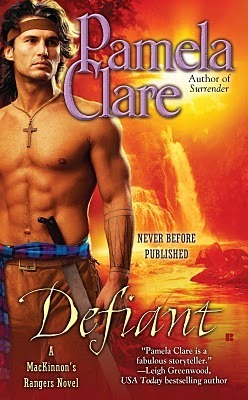
A few quick things...
YES, I do have a newsletter. The post below resulted in several inquiries from regular readers of this blog. You can sign up for it by signing the Guestbook on my website. Just click here.
Also, my son still has several copies of each of my out-of-print historicals for anyone who wants a signed copy. This is the last time I know of that Sweet Release or Carnal Gift will be available in print. Click here for links to the books on eBay. (Both are available as "author's cuts" in ebook format on Amazon.com, BarnesandNoble.com and elsewhere, but not in print. There's more on that in previous posts. Just search by topic.)
And now for news I wish I could change...
Defiant, the third book in the MacKinnon's Rangers trilogy, won't be out till next July. As I was trying to move heaven and earth to meet the mid-October deadline, I realized only one thing would be finished by then — me. My body let me know in a very no-nonsense fashion that coffee-fueled all-nighters and deadline stress were no longer permissable. I haven't had coffee for a week — a real shock to my system — and I still have a long way to go to feel like myself again.
Hoping to survive my own career — and to write a book worth reading — I asked for an extension, and the deadline is now moved back to the end of December. I hope to beat that, which may mean the release date gets bumped forward a bit again.
If I didn't work at the paper, you'd see a lot more books from me. When I was home recovering from surgery, I was able to write almost a chapter a day because I was so in touch with the story. There was no office drama, no special edition deadlines or other writing projects to distract me. But at this point, I still work at the paper, and working full time takes just enough out of me that every Friday I feel like I have to get reacquainted with my novel again. It's really a drag.
My two main concerns are: taking care of myself and producing a book that's worth the money you spend. And if that means you wait a bit longer, I hope you're okay with that. I'd rather have you ask me why this took so long than have you tell me that the book was a letdown.
I won't be online much, and for that reason I also want to list those release dates again:
Surrender (reissued with new material) — Dec. 6
Untamed (reissued with 25 previously cut pages restored) — Jan. 3, 2012
To help take some of the sting out of this news, I'm here with the second (and final?) excerpt from Defiant. Enjoy!
When Connor met Sarah
From Chapter 2 of Defiant
Connor knew the war party had arrived and that she was with them. A murmur of anticipation passed through the village, excited voices penetrating the log walls of the council house, where Connor and Joseph sat, having just smoked the pipe with the village chief, an old woman called Grannie Clear Water.
Grannie had welcomed Joseph like a son, her manner toward Connor somewhat less cordial. Still, she'd fed them both at her fire, accepting tobacco and wampum as gifts from them. She'd listened patiently while Joseph had explained their reason for coming, then had insisted on the Pipe Ceremony. And yet beneath the acts of friendship, Connor sensed the old woman's mistrust of him. She'd called him a brave warrior, but the word she'd used often meant "enemy," as well. There was no doubt in Connor's mind that she considered him to be the latter.
She had refused to speak a word on the matter of Wentworth's niece yet. And there was no rushing her. To bring up the subject again would be rude. She would answer them in her own good time, for she had much to consider. If she yielded too easily to Joseph and Connor's claim, she would anger her people, perhaps even lose headship of the village. Yet she could not ignore the threat of the British or the bonds between her people and Joseph's.
"They have returned!" a boy called in excited Shawnee.
"Katakwa is back!" shouted another.
Connor willed himself to sit impassively, as did Joseph beside him, betraying no interest in the goings on outside the council house.
But Grannie Clear Water met their gazes, then nodded, clearly not fooled. She got to her feet with the help of one of her daughters. "Let us go see the cause for all this noise."
Connor followed her outside, Joseph behind him. They walked to the southern edge of the village, where a crowd had gathered, elders, women, and children shouting at someone, while the warriors of the village stood back and watched in amusement. Connor knew they were yelling at Wentworth's niece, pouring out the rage they felt about the war on her, putting the weight of their grief and hatred upon her shoulders.
It was a common enough custom — this harrying of newcomers and captives. Connor and Joseph had faced it themselves when they'd arrived this afternoon, though not to such an extreme, for they had entered the village as free men and warriors. When their names had been recognized — the name MacKinnon, it seemed, was well known to them — every man, woman, and child had fallen silent. But Wentworth's niece was a captive, and as such she would bear far worse, no matter that she was young and a woman.
"If this doesna humble her, I cannae say what will." But even as he made light of her predicament, Connor didn't like what he saw. He'd been raised to show women gentleness, not to stand idly by while they were treated ill, even if they were haughty and spoiled.
Then the crowd shifted, and he saw her.
So young and fragile she seemed, and yet also defiant. She walked with her head high, neither shrinking from the blows and jabs that were heaped upon her, nor weeping. But he could see she was sore afraid, her eyes wide, her gaze darting here and there, her breathing rapid and shallow. The violence she'd endured was written on her pretty face, a fresh bruise on her cheek, dark circles beneath her eyes, her skin pale. Her honey-colored hair hung in tangled waves almost to her waist, her cloak and gown tattered and dirty.
"So that's Wentworth's spoiled princess," Joseph said.
But Connor didn't hear him. He forgot the lassie was kin to Wentworth. He forgot he was a guest in this village, bound by custom not to interfere. He forgot everything except the fact that he'd come for her — and she needed his help.
He took a step in her direction, Joseph's muttered warning calling him back to himself. "If you want to help her, stay where you are and hold your tongue."
Connor swore under his breath, forcing himself to do nothing but watch while a tall warrior, his face painted in black and red, led her through the throng, his control over her assured by a leather cord he'd bound tightly around her wrists. He gave a tug, jerking her forward as if she were an animal.
Connor wanted to kill him.
Then the warriors of the village began to form two opposing rows, clubs in hand, a sea of onlookers gathering around them.
They were going to make the lass run the gauntlet.
Connor started forward, rage drumming in his chest, only to be stopped by Joseph's iron grip on his arm.
"You know they will not seriously hurt her." Joseph's voice was a whisper. "Do not forget, brother, that we are outnumbered."
The man who held her bonds — the one they called Katakwa — made her stand at one end of the two opposing rows, then removed the leather cords and left her there alone, dark bruises around her wrists where she'd been bound.
She seemed to realize what they meant to do, her panicked gaze darting among the warriors, taking in the grim looks on their faces and the weapons in their hands, her breathing erratic, her fingers clenched in her skirts.
Be strong, lass.
Apparently impatient, Katakwa gave her a shove, knocking her to her knees between the first two men, who struck her repeatedly on the back with their clubs, hitting her hard enough to cause her pain, but not hard enough to wound her. She struggled to stand, only to be struck by the next two men the moment she reached her feet, their war whoops and the shouts of the crowd all but drowning out her frightened cries.
Connor gritted his teeth. It took every bit of will he possessed to stand there and do nothing. His father had taught him that God had given men strength so that they could protect women and children, not so they could harm them. To watch while grown men beat a defenseless woman…
The bastard sons of whores!
She stumbled forward, holding her arms up to her head to ward off their blows, buffeted back and forth as the men struck her. But it was clear she understood now that her suffering would end once she reached the end of the line. Her gaze fixed on that spot, and she tried to run, struggling to stay on her feet as she was struck again and again, until at last she pitched forward and broke free, landing on her hands and knees in the mud.
It was over.
Connor let out a breath, willing himself to stand rooted where he was.
Breathing hard, her body trembling, she slowly lifted her gaze, looking about as if to see what lay in store for her next, fear, shock, and pain mingled on her face, tears sliding down her cheeks. It was then she saw him, her gaze locking with his. And the plea in her eyes was as clear as is she'd cried the words aloud.
Help me!
* * *
Her back and arms still stinging from the sharp blows, Sarah stared up at the man, her gaze taking in the sight of him all at once. Though his skin was brown from the sun, his features were clearly European. His eyes were a deep shade of blue, his hair long and dark, braids at each temple. Unlike the Indian men who had no beards, his jaw was dark with stubble. He wore leather leggings and moccasins like an Indian, but his shirt was of blue-checked homespun, the cloth of it all but concealed beneath a shaggy bearskin coat.
Was he French? He must be. Who else would live among Indians hostile to the Crown?
She met his gaze, saw an emotion in his eyes she could not read. "Aidez-moi, monsieur! S'il vous plaît aidez-moi!" Help me, sir! Please help me!
Whether he'd understood her, she couldn't tell, for in that moment her view of him was blocked by beaded skirts and leggings. Gentle hands drew her to her feet, and two gray-haired women guided her away from the crowd, one at each arm, speaking to her softly, like a mother speaking to a frightened child, their words foreign.
When Sarah looked over her shoulder, the man was gone.
As the women led her though the village, it seemed to Sarah that she had passed into another world. Small, round lodges clustered together looking much like a village of large gray beehives. Men and women went about their work, the men dressed much like Katakwa, the women wearing shirts with leggings and beaded skirts, their hair braided. A butchered deer hung from a wooden frame, its head sitting on a bed of dried reeds. Children ran through the maze of lodges, shouting and laughing, dogs nosing for scraps in the mud.
But, although people stared at her as she passed, there were no more shouts, and no one hit her, pinched her, or pulled her hair. Had the beating she'd just endured been some kind of initiation rite? If so, perhaps the worst of it was over.
She prayed with all her heart it was.
They came to a small lodge, its walls made like the others — great mats of tree bark held in place by twined ropes and rocks. The women pushed aside a door cover of woven grasses and went inside, motioning for Sarah to follow. She ducked down and entered, the door falling into place behind her.
The lodge was dimly lit but warm, a fire burning it its center, smoke curling out through a small flap in the roof that was propped open by a long stick. Mats of woven grasses covered the earthen floor and adorned the walls like tapestries, designs painted on them in shades of red, yellow and blue. Dried herbs, antlers, feathers, and what looked like a the talons of a large bird of prey hung from the poles that made up the lodge's frame, empty wooden bowls stacked along the wall beside woven baskets filled with acorns, seeds, strips of dried meat. Raised platforms stood against the other walls. Covered with furs and blankets, they must have been beds.
Two other women sat inside tending a kettle on the fire. Both were older than Sarah, one heavy with child, her big belly protruding above her skirt, her breasts bare. And though Sarah knew she should avert her gaze, she'd never before seen the bare belly of a woman who was increasing, nor had she ever seen another woman's naked breasts. She could not help but notice how full and dark the woman's nipples were compared to her own.
The women who'd brought her here sat on mats and motioned for her to do the same. Feeling sorely unnerved to be near a woman who was all but naked, she settled her skirts around her and was made to listen, while each of them took turns speaking to her with foreign words, smiles on their faces. Unable to understand them, and keen to avoid seeing things she should not see, she focused instead on their faces.
Like Katakwa, they had lines and dots etched into their skin, but none of them were pierced through the nose. Strings of beads and polished shell were tied around their braids and hung through loops in their earlobes, bands of purple and white shell at their throats. One reached out, tenderly touching the bruise on Sarah's cheek, another stroking her hair, as if they regretted her suffering.
And her hope rekindled.
"Parlez-vous français?" Sarah asked, eager to understand them—and to make herself understood. Perhaps they might be persuaded to let her go. "Do you speak English? Loquerisne linguam latinam?"
But they looked at her with blank faces, clearly not comprehending what she'd said.
They stood as one and drew her to her feet. Then the one who was with child took up a small knife Sarah had not noticed before and moved toward her.
Sarah's heart gave a hard thud. She jumped to her feet and backed away. "N-no! Don't!"
But the other women rose to their feet and held her.
"No! Please!" She squeezed her eyes shut as the blade arced through the air toward her chest, the strength all but leaving her legs as she whispered what she thought would be her last words. "Lord have mercy upon—"
Then she felt a tug and heard a tearing sound.
She opened her eyes to find her clothes being cut from her body, the knife slicing cleanly through her gown, her silk stays, her chemise. Fear became rage, and she fought to free herself. "Stop! Why are you doing this?"
But they were stronger than they seemed, their hold on her like iron.
Someone patted her on the arm, the women speaking in soothing tones as the blade cut through her petticoats and drawers, and her clothes fell to the floor, leaving her completely naked. The garments were tossed aside, and the women moved around in front of her, their gazes passing over her body as if they were examining a mare.
Sarah covered herself and looked away, her face burning. No one had seen her naked since she was a very little girl, not even her mother. To be exposed like this…
Then hands guided her nearer to the fire and the women sat on their heels, motioning once more for her to do the same. One arm across her breasts, the other covering her most private flesh, she sat, unable to meet the women's gazes. She heard water being ladled from the kettle, heard something splash, and then felt the press of a warm wet cloth against tender bruises on her back as they began to bathe her.
Was this their intent? Did they simply mean to bathe her? What did they mean for her to wear afterward? Did they hope to dress her as they dressed?
Sarah had so many questions, but no one to answer them.
Gently, they washed her back, her face, her neck and throat, her shoulders and her arms, spreading some kind of soap across her skin, then rinsing it away, the warm water and the fine leather cloth soothing her sore muscles and bruised flesh. Wherever they washed her, they also applied a honey-scented oil, kneading it into her skin. And as they cared for her, their hands gentle, their voices calming, Sarah felt herself begin to quieten, some of her fear edging away.
Being attended in this manner was not altogether unfamiliar to her, though her lady's maids never bathed her, nor did they see her naked. They brushed her hair and…
Jane.
Sarah felt a stab of pain behind her breastbone, tears blurring her vision. Only yesterday morning Jane had helped her with her toilette, brushing and styling her hair, helping her with her petticoats and stays. And now sweet Jane was—
One of the Indian women began to wash Sarah's breasts, the startling sensation drawing her back to the moment, making her gasp.
"No, please don't!" She tried to push the woman's hands away, but the other women restrained her, speaking soothingly to her. She was given no choice but to endure it — the rasp of the cloth across her nipples, the slickness of the soap, the heat of the water, the silky warmth of the oil. It felt so strange and unsettling, her face hot with shame.
If Mother could see this… If Mother should learn of this…
And Sarah feared she might be sick.
They washed and oiled her breasts, her belly, her hips, her legs and her feet, which they gave extra care, clucking and frowning over the blisters as if truly distressed to see that she'd been hurt. When this was done, they bent her over a deep bowl of heated water and washed her hair, then brushed away the tangles with a bundle of stiff grasses, smiling and speaking in approving tones about her hair. And as they brushed her hair with gentle strokes, the sensation familiar and pleasing, Sarah began to feel unbearably sleepy, exhaustion taking hold at last.
Then the one who was with child draped a fur around Sarah's shoulders and motioned her toward the bed. Thinking they wanted her to sleep, she gratefully crossed the lodge and lay down, but when she made to draw up the blankets, they stopped her, one of the women approaching the foot of the bed with what looked like small clamshells in her hands.
With no warning, three of the women pinned Sarah to the bed, spreading her legs far apart and holding them there, pinning her with their weight.
"What are you doing? No! Stop!" She tried to twist away, but the three of them together were far stronger than she alone.
Then the one with the clamshells settled herself between Sarah's thighs and, using the edge of the shells, began to pluck away the hair that covered Sarah in that place.
"Oh!" It was terrible and indecent, and it hurt more than Sarah expected.
But far worse than the physical pain — or the deep humiliation of knowing that they were looking at that most secret part of her — was the shock that came when she realized why they were doing this. They hadn't simply bathed her so that she could feel clean again. They were preparing her body for a man's use.
Sarah squeezed her eyes shut, turned her face away, and prayed.
(c) Copyright Pamela Clare 2011
September 15, 2011
Newsletter contest winner
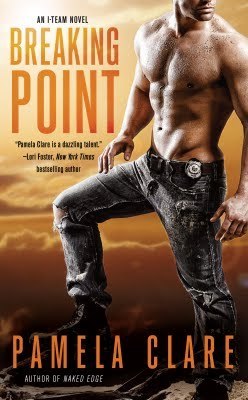
Congratulations to
Maude Allen!
She is the winner of the signed copy of Breaking Point!
Thanks to all of you on my newsletter list who took the time to write back. There was no way I could answer all of your emails, but I did read each and everyone.
Thanks so much! Please stay in touch and watch for news here on my blog.
September 11, 2011
An Interview with Christy Reece by Ronlyn Howe
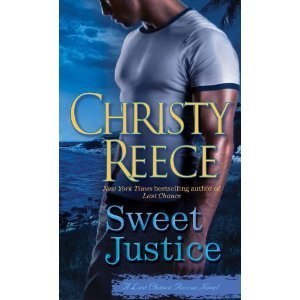
This week, I turn things over to Ronlyn Howe for an interview with the talented and wonderful Christy Reece. Ronlyn, take it away...
@font-face { font-family: "Verdana"; }@font-face { font-family: "Verdana"; }@font-face { font-family: "Calibri"; }p.MsoNormal, li.MsoNormal, div.MsoNormal { margin: 0in 0in 10pt; line-height: 115%; font-size: 11pt; font-family: Calibri; }a:link, span.MsoHyperlink { color: blue; text-decoration: underline; }a:visited, span.MsoHyperlinkFollowed { color: purple; text-decoration: underline; }span.apple-style-span { }.MsoChpDefault { font-size: 11pt; font-family: Calibri; }.MsoPapDefault { margin-bottom: 10pt; line-height: 115%; }div.WordSection1 { page: WordSection1; }
Meet Christy Reece, the creator of Last Chance Rescue, a highly trained group of mercenaries with one priority and purpose, to rescue victims. With worldwide connections and a phenomenal success rate, LCR operatives find and rescue victims when all other avenues have been tried and failed. They do whatever it takes, no matter the risk, to rescue the innocent. (description of LCR taken from Christy's website www.christyreece.com ) I was lucky enough to get to know Christy shortly after the first LCR book (RESCUE ME) hit the stands and I instantly wanted more. Lucky for me and all her other fans, she's delivered one book after another of the LCR gang and their exciting rescues. And, I was also lucky enough to be able to interview Christy on her newest release as well as try to weasel some details of her next book out of her.
SWEET JUSTICE is the seventh installment of the LAST CHANCE RESUCE series. Did you ever imagine it would come to nine books?
No, I never anticipated when I was writing RESCUE ME that this would be a nine book series. However, each time I wrote a book, I'd become interested in a secondary character, so I'm very grateful I had the opportunity to write eight more books about characters that I fell in love with in previous LCR books.
Since we're on Pamela's blog, the home of MTM, did you have any specific men (celebrities or civilians) in mind for the physical characteristics of any of your characters as you were writing them?
I rarely have celebrities in mind when I'm writing. My book characters are real to me, so putting a famous face on any of them just wouldn't work. There was a commercial a couple of years ago with a tall, extremely handsome man with smoky blue eyes that could have been Cole Mathison, but I haven't seen him in anything else. And when I was writing NO CHANCE, I saw a model in a magazine that to me was Skylar James, but that's as famous as I usually get in imagining my characters.
However, I often have Gerard Butler's face in my mind because...well, you know. (:
SWEET JUSTICE is a reunion romance between Honor Stone (who we first met in SECOND CHANCE) and Seth Cavanaugh, the man who broke her heart. Was it difficult to have the past baggage of their previous relationship and work in the forgiveness aspect?
I knew how much they loved each other from the beginning, so bringing them back together and having them deal with their pain just added another dimension to the story. And with them needing to focus on the case but battling their feelings created even more conflict.
Speaking of the case, we meet your most vile villain to date (IMO) in SWEET JUSTICE, and that's saying something because you have had some really nasty bad guys in your previous books. Dare I ask how you're so good at creating these monsters? ;-)
LOL Alden Pike is awful, isn't he.
One thing I like to do is make the mission of bringing down the villain personal to my hero and heroine. And that means, having some sort of connection to them. In all my LCR books, the villain has some sort of relationship to either the hero or heroine or in the case of RESCUE ME, my heroine just wants to keep young girls from experiencing what she went through. Using that criteria--which ups the stakes considerably--I also want to match him/her up with my hero and heroine. The villain must be a worthy opponent in strength or intelligence or both. Then I build my villain. Each time the reader sees the villain, I want something new about him/her revealed and I want the reader to be a little bit more determined to continue to read in hopes of seeing the creep get his just deserts. (:
Can you tell us an "inside scoop" on the next book, SWEET REVENGE, which is coming out on October 6th?
(Editor's note: These are some hot covers! Love the colors, too!)
SWEET REVENGE is the story of LCR operative Dylan Savage and Jamie Kendrick. The book begins with Dylan rescuing Jamie from Stanford Reddington's house. She was actually rescued near the end of LAST CHANCE, but the reader only saw what happened outside the house. This time, we get to see what happened inside, in Dylan's perspective.
When it's clear that Reddington isn't going to be prosecuted and that he's involved with even more heinous things than what he did to her, Jamie devises a way to get to him and asks LCR to train her. Dylan trains her but his intent is to gain her trust so she'll tell him how she plans to get to Reddington.
In the midst of their training, they fall in love. Then, everything comes to a head and Jamie storms out the door. A couple of months later, they both get a shock. (:
Jamie is probably the most tenacious heroine I've ever written. She just would not stop or back down. Dylan might have surprised me even more than Jamie. So totally hot and heroic but with a SWEETness that made me smile.
What type of surprises have you run into while writing the LCR gang?
And oh wow, that's the hardest question for me to answer. There's not an LCR book that hasn't surprised me numerous times. Since I write only by a loose outline, I rarely know what's going to happen until it appears on my computer screen. I guess the best surprise was that Eden St. Claire worked for an organization called Last Chance Rescue. I was in the middle of writing RESCUE ME when I learned she worked for a rescue organization. From there, it developed and the LCR series was launched.
Thanks so much for taking the time to answer all my questions! Is there any other little tid bits or gems that you'd like to share with us?
Just want to thank everyone who buys and reads my books. Being a published author is a dream come true for me but wouldn't mean near as much if there weren't readers who enjoy my books!
Once again, many thanks to Christy Reece for taking the time to answer my questions. If I know Christy, she'll be popping in to say hi here as well, so if you have questions please don't hesitate to ask away.
September 5, 2011
DEFIANT — The first-ever excerpt
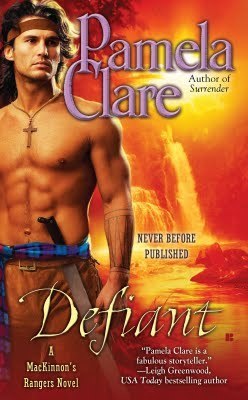
I won't be around much between now and the end of October because I'm working as hard as I can to finish Defiant by a dropdead deadline of mid-October. I've never written as much in this short a period of time in my life, and I'm trying new writing techniques to make it work. But one thing is for certain — I can't hang out online.
You can watch the little graphic above to see how I'm doing. I'll update it every Monday. And feel free to send good vibes, positive writing energy and any spare muses you have stuck in your pockets.
In the meantime, I thought I'd leave you with something to tide you over.
Defiant, the third book in the MacKinnon's Ranger series, will hopefully be out in March. It tells the story of Connor MacKinnon, the youngest MacKinnon brother, and Lady Sarah Woodville, who is Lord William Wentworth's niece. Taken captive while on her way to visit with Lord William, Sarah disappears into the wilderness, and Connor and Joseph, Connor's Mahican brother, are sent alone to find her. When they do, they learn that she is to be made the unwilling wife of one of an Indian warrior whose wife was killed by British soldiers. The only way Connor can win her freedom is to risk his life in a battle to the death — and claim her as his own.
And now, without further ado, an excerpt from Defiant.
From Chapter 6
Sarah was still lying down, facing away from the door, when she heard him enter. She lay there unmoving, childishly feigning sleep, as if refusing to open her eyes would somehow keep the world at bay.
Major MacKinnon called to her softly. "My lady?"
Do not behave like a witless girl, Sarah. Where is your courage?
She wiped the tears off her cheeks, then slowly sat up, the dread in her heart seeming to weigh her down. "Major MacKinnon."
"'Tis sorry I am to disturb your sleep, but I must speak wi' you."
She stood, turned to face him, whatever she'd been about to say momentarily forgotten as she took in the sight of him. His jaw was clean-shaven, his face startlingly handsome. His chest and belly were smooth now, the dark curls she'd seen before gone, his skin oiled to a fine sheen, the cut she'd stitched and the other smaller cuts he'd gotten during the fight giving him a dangerous air. His hair was damp, a striped brown feather tied at the end of one of his braids. His leather breeches rode low on his hips, a knife sheathed at his side.
But what she noticed most was the anguish in his eyes. It was a match for the anguish she'd heard in his voice when he'd spoke to Joseph outside.
"Please… Please sit, major." She sat, reaching down out of habit to shift her skirts before she sat, only to feel doeskin against her hands. "I wish to apologize for my fit of temper earlier. You have risked much for me. It was wrong of me to—"
"Shhh, lady." He pressed a finger to her lips and sat facing her. "You're far beyond the world you ken, aye? 'Tis natural for you to be feelin' afraid and angry about what has befallen you, but you must trust me if we're to reach Albany alive."
He looked away for a moment, his face growing more troubled as he seemed to consider what to say next, his brow furrowed. "I fear I have failed you, for it is on that same troublin' matter that we must speak."
She watched him struggle to find the words to tell her what he'd just told Joseph, something inside her touched by his obvious turmoil. "I… I overheard you speaking with Joseph just now."
His head came up, surprise written on his face, his gaze meeting hers, seeming to study her face. "That's why you've been weepin'. I see the tearstains on your cheeks."
She raised her palms to her face to wipe the telltale sign of weakness away.
"You understand the choice that lies before you, aye?"
She nodded, folding her hands in her lap. "I must decide whether to chance escape, knowing that you and Joseph will die terribly should we fail, or whether to marry you after the Indian fashion and spend tonight as … as your wife."
"Aye, that's the way of it. 'Tis a hard choice you're bein' asked to make, but life is no' always fair."
Sarah knew that only too well.
Major MacKinnon went on. "Is there augh' you would ask me afore you decide? There is little time, I fear."
She shook her head. "No, sir."
She'd made up her mind before he'd entered the lodge.
She met his gaze, tried to keep the fear from her voice. "I cannot ask you to chance being burnt at the stake, major. You've already risked your life once for my sake. As highly as I value my virtue, it is not worth two men's lives."
What an irony that her father's decision to send her away had led her to this — her true undoing. No doubt there were many in London who believed she had no virtue, yet she had left London as a virgin. She would not return as one.
He watched her through dark eyes. "Are you certain, my lady? For I willna take you by force. You must come to me as willingly as I come to you — each of us for the sake of the other."
She hadn't thought about it in quite that way, but when he spoke the words, some of the dread lifted from her heart. "Aye, major, I am certain. But…"
"You're afraid." He closed one big hand over both of hers, his thumb stroking her knuckles. "I promise I shall treat you this night wi' the same care and devotion I would if you truly were my bride."
Then to her astonishment, he cupped her cheek, lowered his lips to hers — and kissed her.
Softly, so softly he kissed her, brushing her lips with his again and again, the mere whisper of a touch making her shiver. She might have objected had the sensation not been so… enthralling. Slowly, his touch became more insistent, his lips caressing hers, nibbling them, her lips tingling, going pliant, yielding to his exploration, her eyes drifting shut. Then his tongue traced the outline of her lower lip.
Startled, she gasped, and her eyes flew open.
He was watching her, his blue eyes dark, his voice a whisper. "My lady."
And she thought it was over.
But then one big hand slid into her hair to cradle her head, and he drew her against his bare chest, his mouth closing over hers. There were almost too many new sensations to take in all at once, her girlish notions of what it would feel like to be kissed by a man vanishing in a heartbeat. The iron-hard feel of his body surrounding her. The warm scent of his oiled skin. The firm pressure of his lips against hers as he tasted her, his tongue teasing its way inside her mouth with silken strokes.
Then his tongue touched hers, his lungs stealing her surprised intake of breath as he sealed her mouth with his. Her body seemed to melt, and she sank boneless against him, her hands sliding up the smooth skin of his chest, her lips parting to accommodate him, her tongue meeting his. She felt something pound against her palm, and realized that his heart was beating every bit as hard as hers.
Slowly, his kiss stilled, his lips brushing her cheek, her temple. "My lady."
Breathless and amazed, she looked up into his eyes.
He drew back slightly, his arm still encircling her. "Now you ken the taste of my kiss. Think on that, and dinnae be afraid of what is to come, aye?"
(c) copyright 2011 Pamela Clare
-------
I hope you enjoyed that. Connor and Sarah have a big adventure ahead of them, that's for certain. And finishing this book is going to be an adventure for me.
In the meantime, here's a look at the schedule for my historicals for those of you who are interested.
Sweet Release (Kenleigh-Blakewell Family Saga, Book I) — available now as an ebook on Amazon.com, B&N, iTunes and Smashwords
Carnal Gift (Kenleigh-Blakewell Family Saga, Book II) — full-length author's cut available now as an ebook on Amazon.com, B&N, iTunes and Smashwords. This is the first time this has been available. More than 100 manuscript pages were cut from the story as it was first published. This is the book as I intended it to be. The book contains a pronunciation guide for those Gaelic names.
Surrender (MacKinnon's Rangers, Book I) — To be reissued on Dec. 6 with new material and a new cover. Iain and Annie got a facelift and about 20 manuscript pages of new material.
Untamed (MacKinnon's Rangers, Book II) — To be reissued on Jan. 3, 2012, with a gorgeous new cover and 25 previously deleted pages restored. This is the book as I wrote it.
Enjoy!
I'll see you in about two months...
August 26, 2011
Happy Birthday, little sister!
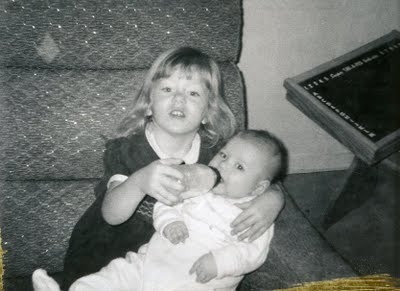
One of the luckiest days of my life was August 27, 1966. That's the day my baby sister was born. She was my baby sister and no one else's baby sister.
I cherished her, played with her, cut all her hair off. I did my best to help take care of her. She was so important to me that I had nightmares about her getting hurt or getting lost. I remember one night waking up in tears and screaming because I dreamed she'd chased a ball into the street and a car had come. My mother had to wake Michelle up and show me that she was okay to stop my crying.
I was 4.

She and I shared a bedroom until I was about 10. We shared lots of toys and a love of plants and animals, too. We had guinea pigs, a hamster, a cat and mice. I named my mouse Rush, after the rock band and the fact that it ran very fast, she named hers Mousie. Then there was the time she brought home a white kitten and kept it hidden in her bedroom closet. She named it White Kitty. When the kitten finally came out of the closet, we renamed it Noël, because it was white and it was almost Christmastime.
Of the two of us, I have the flare for naming things.
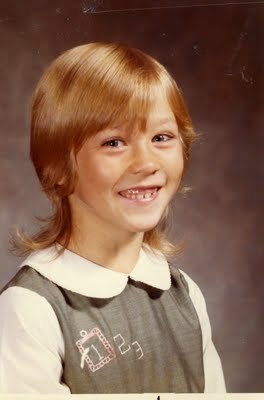
We played outside all the time during the summer, swinging on our swing set, making up games in the back yard, sneaking off to a candy store called The Strawberry Pony — which I accidentally called The Pink Horse many times — for ice cream.
We were inseparable.

If I could tell you all one thing about my sister it is that her disposition has always been sweet. You can see it in her lovely face in these photos — a genuine sweetness. When I had nightmares, I would crawl in bed with her and feel safer even though I was older and bigger than she was.

In the summers, we watched re-runs on TV, and I can remember a time when we sincerely wanted to be genies as in I Dream of Jeannie. We talked about our bottles — how they looked, what was in them. We did our best to blink spells. Nothing happened.
We both loved Star Trek, too, and together with our two brothers watched it every day, acting out the episode afterward. To this day, we are a family of Trekkies.
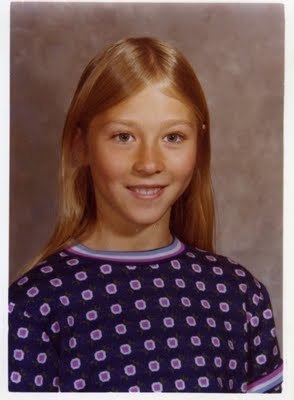 Michelle had a talent for gymnastics that I as a klutzy left-handed person simply did not share. I remember watching her do walk-overs and wishing I could do them, too. I had to be content with cartwheels.
Michelle had a talent for gymnastics that I as a klutzy left-handed person simply did not share. I remember watching her do walk-overs and wishing I could do them, too. I had to be content with cartwheels.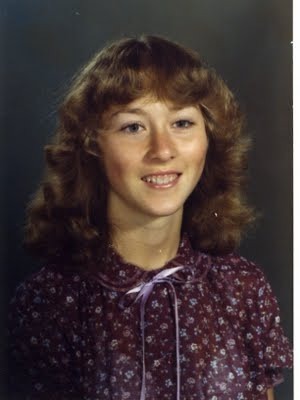
We both had stick-straight hair as little girls. Then around the age of 10, our hair got curly. In the age of straight hair and feathered bangs, this was agonizing. Now, however, we have gotten the last laugh, as other women spend hundreds for spiral curl and we just wash, rinse, comb.
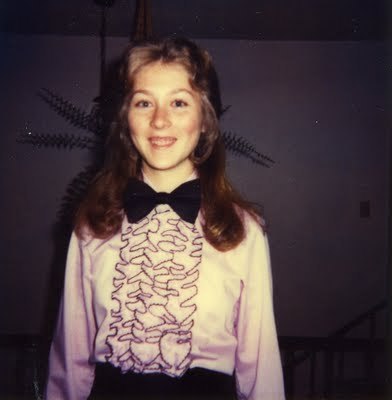
I have no idea what this photo is from. Choir? Marching band? Concert band? We shared a love of music, as well. We still do. Rock. Classical. Celtic. We both love to sing, and when we're together we inevitably end up singing along to whatever happens to be playing.
Sometimes one of us gets the lyrics wrong. This has been the source of much hilarity. I mean what is a "studded sharfore" anyway? If the lyric describes something that does not exist, shouldn't that be a clue that you've got it wrong?
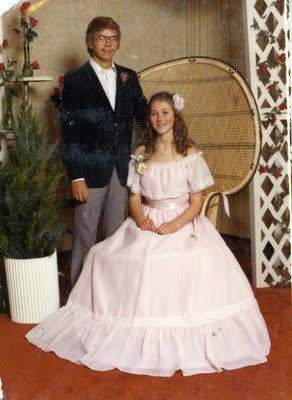
I wasn't around when Michelle went to prom. I was in Europe, but she soon followed me over there, living in Sweden while I was in Denmark. I think her date here is a Finn kid named Pekka. Many Finns are named Pekka.
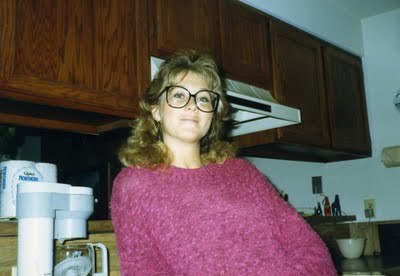 Michelle was a beautiful baby, and she grew up to be a beautiful woman. Her sense of humor is sharp and can be very cutting at times. Like me, she discovered her temper later in life. But even when she's really pissed off, she makes me laugh.
Michelle was a beautiful baby, and she grew up to be a beautiful woman. Her sense of humor is sharp and can be very cutting at times. Like me, she discovered her temper later in life. But even when she's really pissed off, she makes me laugh.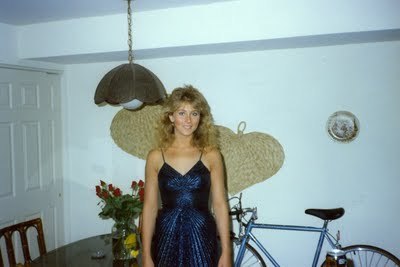 But we never spent enough time together as adults. For a while I was in Europe. During our college years, I had babies, while she had a social life. She moved to California for a while, and that was probably the time when we had the least contact.
But we never spent enough time together as adults. For a while I was in Europe. During our college years, I had babies, while she had a social life. She moved to California for a while, and that was probably the time when we had the least contact.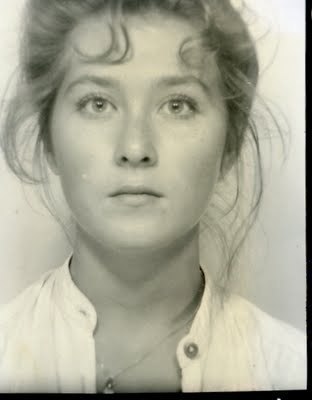 From there, she went back to Sweden, where she now has citizenship. I had two kids to raise and couldn't leave the United States. (That's ironic because I was the one who'd wanted so badly to settle in Scandinavia and live the rest of my life there. Life is not without a sense of humor.)
From there, she went back to Sweden, where she now has citizenship. I had two kids to raise and couldn't leave the United States. (That's ironic because I was the one who'd wanted so badly to settle in Scandinavia and live the rest of my life there. Life is not without a sense of humor.)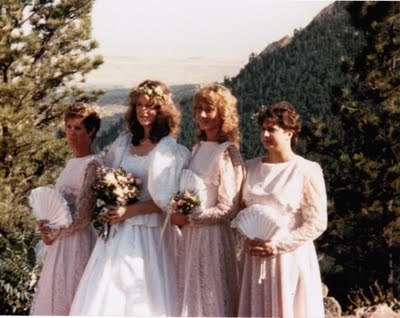
She was my maid of honor at my mountain wedding (I'm in the poofy white Princess Di knock-off, and she's standing behind me). And although the wedding should never have happened — women, just throw yourselves a fancy party with a beautiful dress, an elaborate cake and gifts, then get artificially inseminated — we had fun getting dressed up and playing with the flowers and our hair.
We talk on Skype almost every weekend. Sometimes she calls me at work — always a welcome interruption. And she always comes home for Christmas. But I miss her every day.
We never run out of things to talk about. There's True Blood and Game of Thrones and Spartacus and Jack Bauer. And there are my books.
I cannot begin to tell you the number of hours Michelle has spent with me on the phone or on Skype talking about whatever novel I'm writing, reassuring me, supporting me, letting me "talk" the story out. Without her, I don't know whether I'd have nearly as many novels written or whether any of them would be any good.
No one lifts my spirits when I'm down the way she does. My boys tell me that she and I are always laughing when we're together, and that's true. We're both single and talk about living together again. To end my days living in a flat in Stockholm with my sister and a bunch of cats would be just fine with me because I know I'd die with a smile on my face.
I don't know that I've been as good a sister to her as she has been to me, but I have loved her every day of her life.
Happy Birthday, Michelle!
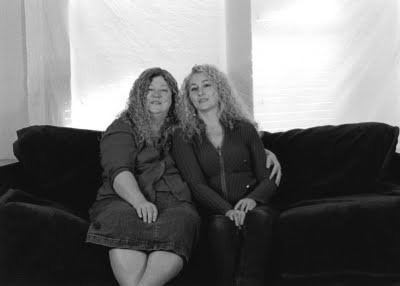
Sisters and friends forever.
August 24, 2011
Presenting the 'author's cut' of CARNAL GIFT

You can't imagine how exciting this is for me.
Back in 2003, as my first novel, Sweet Release, was hitting bookstore shelves, I was hard at work on my second novel, Carnal Gift. This one told the story of Jamie, the little brother of the heroine from Sweet Release. All grown up, he's in Ireland and Britain on behalf of the colony of Virginia to get the British to take seriously the conflict against the French and their Indian allies in North America.
Why does he do this? Because his nephew, his sister's firstborn son, Nicholas Kenleigh, was taken in a skirmish with the Indians and burnt to death. (Nicholas makes an appearance, alive but changed, in the epilogue. That was cut from the original version.)
This deep personal incentive is what drives him throughout the book. But, if you read the version that was published, you never knew this because this entire thread — what happened to Nicholas, Jamie's guilt over being unable to save his nephew, his efforts to win the support of Parliament for a fleet of ships and more soldiers — was cut from the book because the book was too long.
Yes, the book was too long.
I cried for a month when I was told by my editor that they didn't make any exceptions when it came to their maximum number of pages. The weight/thickness of the books determined how many could fit in a box and how much it would cost to ship them. Fewer books per box and heavier boxes means higher shipping costs. And so Jamie's story landed on the cutting room floor in pieces.
When I got the rights back to Carnal Gift last October, I was so excited because it meant that for the first time I would be able to share with you the story I had written. The story that was published has never felt like my books. How could it with more than 20 percent of the pages gone?
And now the full story is available at last. Jamie and Brighíd finally get their full story told. The copy on the back of the book is the same:
"I expect you to show my friend just how grateful you are. Your willingness is everything."
With those harsh words, the hated Sasanach earl decided Bríghid's fate: Her body and her virginity were to be offered to a stranger in exchange for her brother's life. Possessing nothing but her innocence and her fierce Irish pride, she had no choice but to comply.
But the handsome man she faced in the darkened bedchamber was not at all the monster she expected. His green eyes seemed to see inside her. His tender touch calmed his fears while he swore he would protect her by merely pretending to claim her. And as the long hours of the night passed by, as her senses ignited at the heat of their naked flesh, she made a startling discovery: Sometimes the line between hate and love is dangerously thin.
But what's inside includes those 100 pages, re-edited by me. When I got the chance to go through the book again, I was blown away by how much better my writing had gotten between Sweet Release and Carnal Gift. Also, I'd forgotten the story, partly out of a desire not to think about the fact that the book I'd written had been butchered. Reading it for the first time in eight years, I fell in love with the characters all over again and found myself really wanting to get to Ruaidhrí's story as soon as possible. (Those of you who've read the book know that Ruaidhrí is the heroine's smart-mouthed 16-year-old little brother who almost gets himself hanged.)
Set in Penal Era Ireland, it tells of a history that is largely forgotten over here, when Catholicism was outlawed and priests could be hanged for performing mass. Jamie, our Tide Water plantation hero, sees the world with very different eyes than average subject of His Majesty King George. Taking a look at the biases of Britain through Colonial eyes was fun for me.
The plot remains unchanged. Jamie is given a sex toy by his friend Lord Byerly, but that toy is a terrified young woman whom Jamie is expected to force into sex in front of Byerly. Brighíd expects to be raped, but the man to whom she is given is, unbeknownst to her, trying to do all he can to spare her that fate. What follows is a serious falling out between Jamie and Byerly, with the earl holding all the power — and Jamie having all the balls.
Here's an excerpt taking from material cut from the book:
"You're talking about starting a war, Master Blakewell." William Pitt grimaced, adjusted his swollen foot where it rested, covered in foul-smelling compresses, on a cushioned footstool. "Damned gout!"
"I'm talking about winning a war, Sir, for the war has already begun."
Pitt seemed to consider this, his forehead bent in a pensive frown beneath his powdered wig. His large, almond eyes, set in a pale oval face, gave him an intelligent, slightly melancholy appearance, and Jamie knew the man's hard-won political successes had come through wit and oratory. Of all the members of Commons, he was Jamie's best hope — and the most influential.
"What do you suggest?"
"A fleet of ships designed to fight in the lakes and rivers of the north — and well-trained sailors to man them. Attack the French where they're most vulnerable — their supply lines, their own towns. Draw them away from English families on the frontier." Jamie returned Pitt's steady gaze, waited.
"That's a bold plan. It would inevitably force them to fight on two fronts or abandon the frontier." Pitt reached for his teacup, took a sip.
"There's more to it than that, Sir."
Pitt raised an eyebrow. "Explain."
"The French have allied themselves with numerous Indian nations — foremost the Huron, Ottawa, Potawatomi and Ojibwa. Most are led by Obwandiyag, whom some call Pontiac. His intelligence and influence should not be underestimated. Not only is he capable of leading his men in battle, but he could easily win more tribes to the side of the French. He is metai, a spiritual leader, and his words carry great meaning for many." Jamie took a sip of tea, let his words sink in, trying not to overwhelm Pitt.
"Go on."
"If we shift the battle to the great lakes and rivers, the French lose whatever advantage they've gained through such alliances. While Pontiac's men are more than capable of defeating British troops on land, they have no means to counter English warships."
Pitt brow furrowed. "What makes you so certain Indians can defeat trained English soldiers?"
"The Indian way of warfare is not the English way. They attack through ambush, not from battle lines drawn up in the open. The French have largely adopted their techniques. At Fort Necessity, they fired at us from high in the surrounding trees. Good Englishmen died, shot down by an enemy they could not see."
Pitt's upper lip curled in disgust. "That's barbaric."
"Perhaps, Sir." Jamie wouldn't bother trying to explain to Pitt the Indian point of view on warfare. What warrior in his right mind stood out in the open in front of enemies who were firing at him? "Still, that's the way it is. An English regiment might easily wander into such an ambush — on a road through the forest or on the banks of a river — and lose every man. To win this war, Britain must adapt, Sir, or British claims along the Ohio will be lost."
And Nicholas's terrible death will have been for naught.
For a moment, Pitt said nothing but gazed broodingly into the distance.
"Very well, Master Blakewell, I see the point you're trying to make." Pitt wiggled his swollen toes, winced. "But tell me—who would supply such ships?"
"My brother-in-law, Alec Kenleigh, has already drawn up plans for a small fleet of warships specially designed to navigate the northern waterways."
"Of course." Pitt smiled. "War is a bloody profitable business."
Jamie refused to let the comment bait him. "Aye, it can be, Sir. However, Alec is willing to build these ships at no profit to himself."
Both of Pitt's eyebrows shot upward. "At cost? Remarkable."
"My brother-in-law lost his eldest son at Fort Necessity." The pain, the guilt welled up inside Jamie. "He was taken captive and later … burnt alive."
Pitt's eyebrows shot up, before his face shifted into a scowl of outrage. "I do say—how unfortunate and appalling."
Jamie beat back his grief. "It is war, Sir."
"My condolences on your family's loss." Pitt took another sip of tea. "I've heard nothing but good things about your brother-in-law. I'm sorry he should suffer such tragedy."
"Thank you, Sir." Jamie decided to press his point. "The longer Britain delays in meeting the French threat, the greater that threat becomes. English families are dying on the frontier — men, women and children — and the French are working hard to persuade Britain's Indian allies to switch sides. We dare not dally, Sir."
For a moment, the two men sat, gazes locked.
"Very well, Master Blakewell, I shall represent the Colonial cause in Commons. But I warn you, it won't be easy. Most Englishmen are more concerned with events on the Continent, as the results will have very real consequences here in Britain. Most believe the Crown can force concessions from the French with regard to the American frontier by dominating them in Europe."
"They are blind." Jamie stood abruptly, walked to the nearby window. "They would not tolerate the slaughter of English families on British soil here on this island, but the slaughter of British families—"
"Colonists."
Jamie spun to face him. "—British families on the American frontier means nothing to them. For are the colonists not also subjects of His Majesty, equally deserving of his protection and consideration? And what will happen if colonists begin to feel Britain has turned her back on them? It shouldn't surprise me that many would turn their backs on Britain."
"I admire your passion, Master Blakewell, and I agree with you. But it will be an uphill battle, all the more so thanks to your friend." He pinned Jamie with his gaze. "Or should I say erstwhile friend?"
"Lord Byerly."
"He's spreading some rather distressing rumors about you, rumors of collusion with traitorous Irish Catholics. I need to know what truth lies behind these rumors so that I can prepare a proper response."
Jamie had known this would happen. "Of course."
As you may be guessing, this was my first contact with research on the French & Indian War (Seven Years War) and led not only to Ride the Fire, in which Nicholas gets his own story, but the MacKinnon's Rangers series, too.
The book is up and available on Amazon.com, on Barnes and Noble's website, and at Smashwords. It takes forever to get things up on the Apple store for iPads and pods and such, but it will eventually make it there, too, as will Sweet Release.
I would appreciate anything you can do to help me spread the word, including posting reviews after you've read the story if you feel so inclined.
Thanks to Jennifer Johnson of Sapphire Dreams for the lovely cover.
I would love to hear what those of you who've read the original published version think of the difference between the two books. Although some people loved Carnal Gift, some feel it's my weakest book. But they haven't read this version...
To celebrate, I'm giving away a copy of the ebook. To be entered, simply post something nice about Ireland below.
Enjoy!
August 23, 2011
Something for history geeks
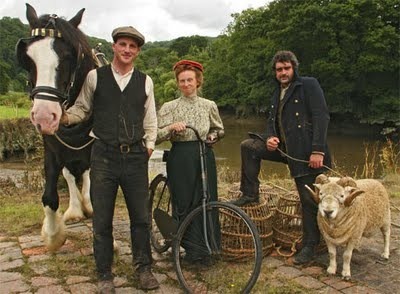
(The brave souls of The Edwardian Farm together with a randy ram and one of their
big shire horses used for plowing and pulling wagons.)
I don't watch television. I don't have cable, and in Colorado if you don't have cable you can't watch TV. The mountains block signal. I remember growing up how irritated I was by this. Even with an antenna, the picture was always fuzzy and prone to disturbance.
But I do love a good documentary. If our local cable providers would permit it, I would order the History and Discovery channels a la carte. But they don't. So about six or so years ago, I told them to take their converter box and shove it. I haven't missed television (which I rarely watched even when I had cable) at all.
When I do watch television programs, it's usually a DVD I've bought or sometimes a program on Hulu, such as Castle, which I love. (The writer jokes crack me up.)
But my sister knows me very well. She sent me a link to a new program that I've absolutely fallen in love with and which I want to share with the other history geeks out there. Of course, there's every chance you've already discovered it. I'm a bit slow.
The name of it is The Edwardian Farm. It's a BBC program that shows life on an Edwardian farm as lived through two archaeologists and one historian who move into an Edwardian farmhouse and begin living the way people lived in that area back around 1900. My degree is in archaeology, and the daily lives of ordinary people is one thing that draws me to writing fiction. No detail is too small. I find everything utterly fascinating.
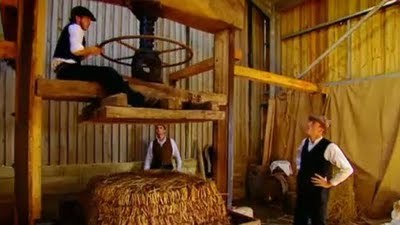 (Here, they're working a cider press on cider apples. That pile of straw in the middle is actually layer upon layer of crushed apples with the straw folded over and laid on top. It's called a "cheese.")
(Here, they're working a cider press on cider apples. That pile of straw in the middle is actually layer upon layer of crushed apples with the straw folded over and laid on top. It's called a "cheese.")And this program goes into great detail. How do you clean germs out of an outdoor privy in that time period? How do you maintain the hedgerows that keep your livestock from running off or getting into your crops? How do you plow a field with horses? How do you make quicklime? How do you preserve food without refrigerators? How do you clean a stopped chimney?
I have loved every episode I've watched — all of them on YouTube — and I can't recommend it enough.
As some of you know, I'm very involved in urban farming and what's called the "localization" movement. Localization is the reverse of globalization. It's about making sure that your community produces what it uses, especially where food is concerned. The idea is to prevent unnecessary pollution and to make your community secure in case of a catastrophe. If you grow your own food and your community produces almost all of the food and goods and services humans need to live and thrive, then the global economy can go to hell without your family being hurt.
On a personal level, it means learning skills your grandparents knew — knitting, quilting, sewing, canning, growing gardens, having orchards, keeping chickens and bees. A person on an ordinary lot can do most of these things (depending on climate), and so provide most of the food their family needs. My grandfather built his own house and fed his six children on an orchard, grape arbor and vegetable garden that he cultivated in their backyard. They also had pigeons, rabbits and a goat (for milk).
We outsource most of that nowadays. Rather than doing these things ourselves, we've grown dependent on others to do them for us. That gives us more time, but what do people do with that time that really counts? Not only are we less connected to our own lives, we are at the mercy of the entire chain of people who supply the goods and the labor. This fact was driven home to me in December 2006 when six feet of snow fell in four weeks in my front yard and the grocery store shelves became empty. Empty. You couldn't even buy sugar.
I don't know about you, but I don't want to be dependent on an entire global mechanism for feeding my family. I don't want to "outsource" my life. I'm trying very hard to "insource" it. (I invented that word, by the way, as far as I know. I'm involved in the localization movement here in the county and was trying to find a term for what we're doing.)
This topic fascinates me, so if any of you are interested in the "transition movement," which got its start in Great Britain and is also called localization, let me know. I may start a separate blog about that.
I enjoy being able to do things for myself and being reconnected with my own life in that way, rather than simply working for a paycheck and spending all that money on things I can learn to do myself. I find it very wholesome and appealing somehow, even if it is a lot of work. And this program, The Edwardian Farm, is basically about these three people learning the skills their great-grandparents had — i.e., reskilling themselves — and learning to be self-sufficient again.
So how do you clean a stopped up chimney back in the day? One option was to stuff a chicken down your chimney. It would flap and claw and break the soot free. But it was also kind of mean to the chicken — something that probably didn't matter back in 1900. Another less chicken-y option was to take branches from a holly bush, bind them together and shove them up the chimney. Fascinating!
Apparently, prior to this, these three had a program called The Victorian Farm, which is equally fascinating. During the Edwardian period, technological advances included combustion-engine plows, indoor plumbing, gas ranges and so forth. When I'm done watching these episodes, I'm going to dive into The Victorian Farm and see what things were like back then.
Update: I'm still going to have the Dessert Diva as a guest together with Natalie. The two will be baking pies. I intended it to be a summer blog, but I have been so, so, so busy that it's now going to preview holiday recipes.
Also, Carnal Gift will be live any day now on Amazon.com. It's been edited and uploaded, and now I'm just waiting. This will be a very special release for me because finally — finally! — the book will be available as I wrote it, instead of missing 100 key pages.
It has taken a lot of time and effort to get the books online. Fortunately, my son Benjamin has handled a lot of it. I've been working on Defiant and trying very hard to stay off the Internet, which has a huge impact on my ability to focus and get work done. So if I'm not around, please forgive me. I need to write!
I'll be back soon to announce the winner of the e-book copy of Sweet Release.
Thanks for being so patient! I owe it to you to put my time into my books and to make them the best they can be.
August 12, 2011
Sweet Release available as an ebook! EXCERPT
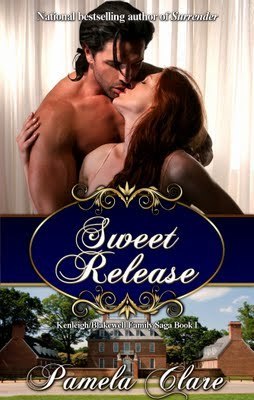
Sorry I've been away so long. RomCon took up last weekend, and work has been so incredibly busy that I've barely had time to breathe. I had a wonderful time meeting readers — thank you, Batbabes for my lovely bracelet! — and other authors. I met Julie James in person. She's gorgeous and smart as a whip. I got to spend more time with Tara Janzen and Cindy Gerard, the dynamic duo. Loretta Chase got my bracelet untangled from my hair. Good times!
And now... I have an announcement.
It took much more time than I thought it would, but Sweet Release, my very first novel, is available again. For the past year, the only place readers have been able to find it is in used book stores. Even the ebook versions were taken down after I got my rights to the novel back from the original publisher.
Now, Sweet Release is available for download on Amazon.com and Smashwords.com and a bunch of other formats.
What a strange experience it was to go back to this book, which I hadn't read since it was published in 2003! As I read it, I decided that my writing has improved dramatically since I wrote that first book. Some things actually made me cringe.
But the story is still incredibly precious to me. It took me seven years to write, a year to edit and then I had to find an agent…
In all a decade of my life went in to Alec and Cassie's story. I started writing it when Alec was 7 and Benjy was 4. Benjy's fascination with pirates folded into the story in Jamie's character, which was created with him in mind.
The book doesn't contain new material, but it is freshly edited. I took the published version of the manuscript and edited it line by line, removing all the cringe-worthy bits and improving the actual writing without changing the story.
For those of you who haven't tried my historicals or haven't tried this series, here's the blurb from the back of the book:
For five pounds in sterling, the convict was hers. Though Cassie hated the slave trade, her Virginia plantation demanded the labor, and she knew this fevered man would surely die if she left him. But as his wounds healed and his muscled chest bronzed in the sun, Cassie realized Cole Braden was far more dangerous than his papers had indicated—for he could steal her breath with a glance and lay siege to her senses with a touch.
Abducted, beaten, and given a new name, Alec went from master of an English shipbuilding empire to fourteen years of indentured servitude in the American colonies. There, he was known as Cole Braden, a convicted ravisher and defiler of women. And while he longed to ravish the auburn-haired beauty who owned him, he knew his one hope of earning her love—and his freedom—was to prove his true identity. Only then could he turn the tables and attain his ... Sweet Release.
And here is an excerpt from the "shackling scene" that everyone loved when Cassie decides to play a game with the convict she owns and loves:
"You're on time, convict." It took every ounce of determination she had not to smile or giggle. "That's good. It will go easier on you."
Cassie could see in his eyes the moment he understood her game. His look of confusion was replaced by surprise and then amusement before his gaze grew cold and hard. "I'm to be punished, then?"
"I can no longer tolerate your insolence, convict. I mean to teach you a lesson." It was good she had rehearsed her lines. It would have been impossible to say them else.
Was she really going through with this?
He leaned against her bedpost nonchalantly, crossing his arms. Defiant and confident, he reminded her so much of the man he'd been when she'd first purchased his indenture. "And what makes you think I'll cooperate, mistress, when I could just as easily break your pretty neck?"
"You'll find what I have in mind far more pleasant than what you'll receive if you disobey."
"I see." His gaze raked over her body in blatant sexual appraisal, and she shivered in anticipation. "And just what do you have in mind?"
"Undress—slowly."
He raised an eyebrow, then untied his shirt and slowly pulled it over his head. It fell, forgotten, at his feet. Candlelight cast the bronzed muscles of his arms, chest, and abdomen in glorious high relief. He reached for the opening of his breeches and began to untie them, his muscles shifting beneath sun-bronzed skin.
Cassie felt desire flow like warm brandy through her veins. "Slowly, convict."
His gaze locked with hers again as ever so slowly he pulled on the ties, undid his breeches, and let them drop to the floor. He was rock hard, his sex thick and heavy.
She found she could scarcely breathe. "Your hair. Remove the thong."
Not breaking eye contact, he reached back with one hand, and his dark hair slid free, falling just below his shoulders. He looked untamed, fiercely male, and, with his lash scars, not a little dangerous. He stepped toward her.
She stepped back and pointed to the bed. "Stop! The shackles. Lock one end around your right wrist, then pass the chain behind the bedpost, lie down, and lock the other end around your left wrist."
He looked at the bed and saw the shackles. She heard his quick intake of breath and saw a shadow pass over his face. Then it was gone.
"Don't you trust me, fair mistress?" His voice was dark as sin and soft as velvet. His eyes held the allure of every man who'd ever tried to beguile a woman into a false sense of sexual safety.
"Never." She smiled and spoke in a rich, seductive voice she didn't know she had. "But I will have your complete cooperation."
"I see." Naked, he walked to the bed, picked up the shackles, and closed one end around his right wrist. It locked with a click. He sat and moved backward across the bed, then reached behind his head and passed the chain behind one of the bedposts. "What makes you think these chains will protect you?"
"Do it, convict."
He lay down, then reached back to cuff his left wrist. Click. He lay diagonally across the bed, completely vulnerable. His arms were stretched over his head. His chest rose and fell with each breath. His rigid sex stood defiantly against his abdomen. His legs, spread slightly, stretched the length of the bed, his feet hanging just over the edge. A tremor passed from Cassie's belly to her sex.
His gaze, cold and menacing, bored through her. "Do you like what you see?"
"Aye, convict. And it's good for you that I do." Almost trembling with excitement, she loosened her bodice until her breasts were visible. Then she moved to the bed and began to caress him, first his feet, then his ankles and calves. Where her hands touched, her lips and tongue soon followed. She heard his breath quicken, felt his muscles tense, and reveled in his response. She worked her way up his muscular legs and over his powerful thighs, but, although she touched the sac that carried his seed, she did not touch his shaft. "You've a remarkable cock, convict."
He groaned in frustration. The chains caught on the bedpost, clinking as he strained against them. "Is this to be my punishment then? To be tortured with kisses, soft hands and words?"
Some part of her she'd never known awoke within her, and she felt herself grow more daring. Like a cat toying with its prey, she stretched across the bed beside him. She ran her fingers teasingly on his abdomen, outlining his erection.
"Your punishment is that you shall see, but you shall not touch. You shall want, but you shall not receive—not until it pleases me."
Coming soon... Carnal Gift.
 This is Jamie's story. All grown up and off to Britain to ask Parliament for help at the beginning of the French and Indian War, he visits a friend of his, a nobleman, Lord Byerly, to ask for his support in Lords. But Byerly is a changed man, and offers him a poor Irish girl as a gift to warm his bed.
This is Jamie's story. All grown up and off to Britain to ask Parliament for help at the beginning of the French and Indian War, he visits a friend of his, a nobleman, Lord Byerly, to ask for his support in Lords. But Byerly is a changed man, and offers him a poor Irish girl as a gift to warm his bed.That's how the story begins, but this won't be Carnal Gift as you all know it. More than 100 pages were cut from the story before it was published, changing the book entirely. I finished writing it after covers were printed, and it was simply too long. On top of that, the original publisher had a limit on how many pages they would publish. They didn't bother to tell me that. So I had to endure the distress of seeing an entire subplot disappear from eh story and then watch as a book I hadn't written was released with my name on it.
But now the book will be published as I wrote it with all 100 pages restored. Not only that, but I gave it a re-edit, as well. I have to say the writing here was light years ahead of Sweet Release, but it was still good to clean it up and update it a bit.
Carnal Gift isn't up yet, but it will be sometime next week. I'll let you know when it is available. It's a long, meaty read now. I can't tell you how excited I am to finally have the book I wrote available for you to enjoy.
Please help me get out the word about these two stories through Twitter, Facebook, reviews, blogs, etc. Thank you!
To celebrate the re-release of my first novel, I'm giving away an ebook copy of Sweet Release. To be included in the drawing, all you need to do is post below.
Have a great weekend!





